
At Clarity Law, we have since 2010 given a commitment to our clients of providing clarity in the middle of a stressful time along with fighting for the very best outcome for their drink driving charge.
Introduction to Drink Driving in Queensland in 2024
In this comprehensive guide to drink driving in Queensland in 2024, we delve into Queensland's drink driving laws, exploring the legal framework, penalties, and potential consequences individuals may face when charged with a drink driving offence. From understanding blood alcohol concentration (BAC) limits to outlining legal defences and avenues for seeking legal representation, our aim is to empower Queenslanders charged with drink driving with all the information needed to make informed decisions on how to deal with a charge of drink driving in 2024.
Facing charges for driving under the influence or drink driving can be an immensely stressful experience. It's natural to feel unsure and apprehensive about the next steps to take.
In Queensland, the mandatory penalties for drink driving will result in the loss of your driver's licence, substantial fines, and repercussions that may impact your present employment, future career prospects, and freedom to travel.
However, by enlisting the support of our seasoned traffic lawyers, you can significantly enhance your chances of mitigating the charges.
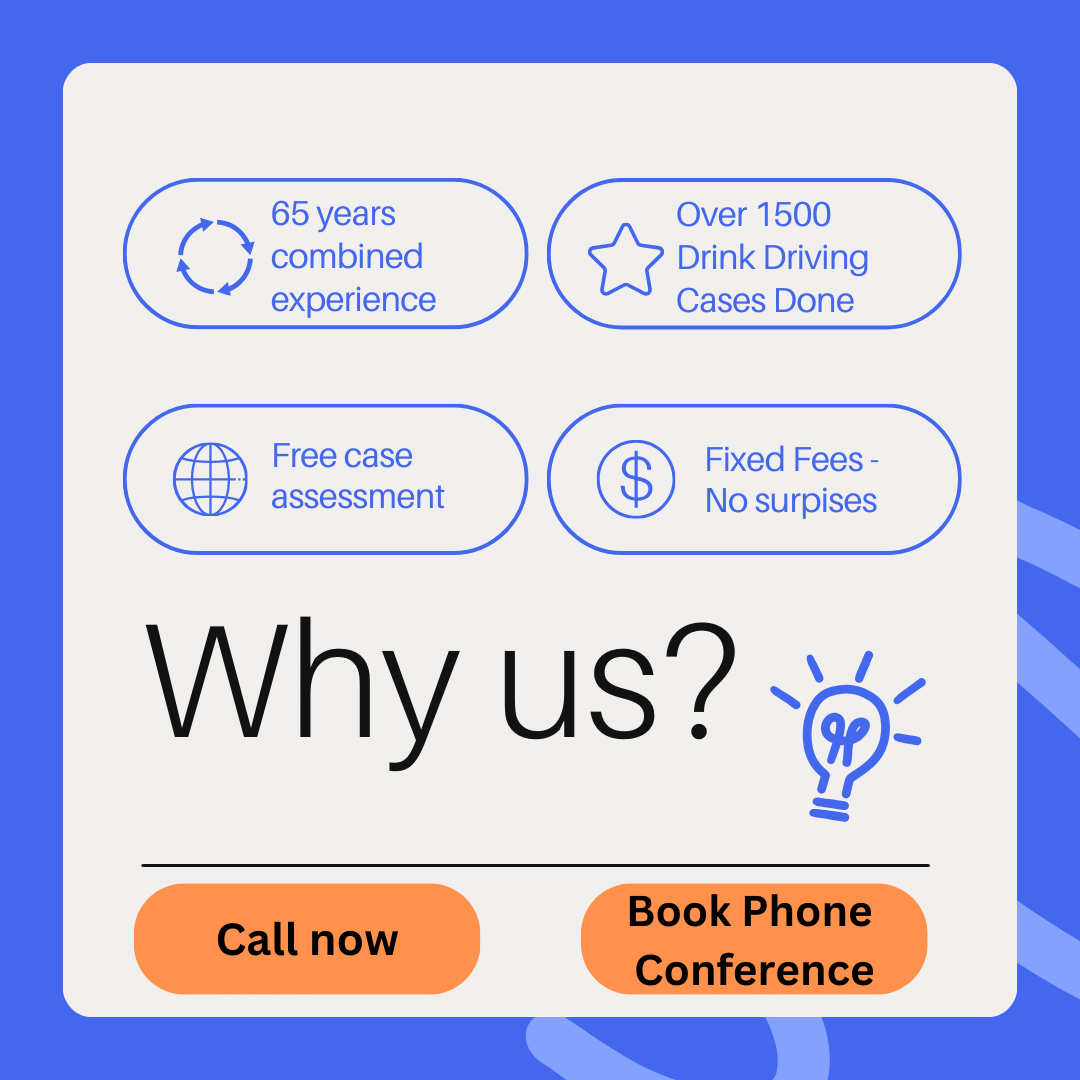
Drink Driving Terms
In Queensland, there are several terms used in relation to drink driving laws. Here's a summary of what they mean:
Drink Drive: This is the general term for driving with alcohol that exceeds the mandated levels for that driver. It encompasses all scenarios where your blood alcohol concentration (BAC) exceeds the legal limit for your licence type.
Low Range: This refers to a BAC between 0.05% and 0.099%.
Mid Range: This refers to a BAC between 0.10% and 0.149%.
High Range: This refers to a BAC of 0.15% or more. This is considered a serious offence and carries the most severe penalties.
DUI: DUI stands for "Driving Under the Influence". In Queensland, this term is not often used officially in legal documents. It is more commonly used as a general term for high range drink driving.
UIL: UIL stands for " Driving under the influence of a liquor." UIL is a term used in the legislation in Queensland and means high range drink driving.
PCA: PCA stands for "Prescribed Concentration of Alcohol." This refers to the specific BAC levels that define the different drink driving offence categories (low, mid, high range). The term PCA is not used in Queensland either in the law or in the courts.
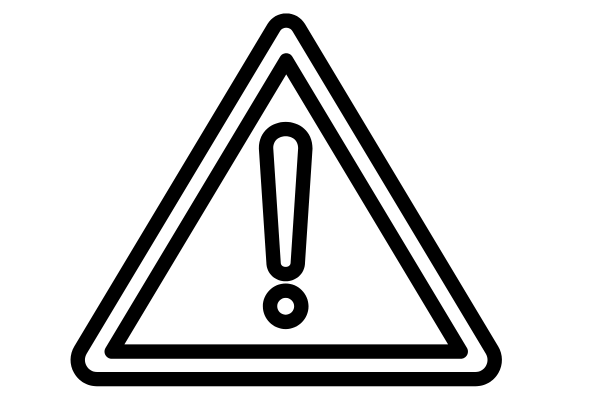
Drink Driving Limits
In 1967, the legal limit for alcohol in your blood (BAC) was a bit higher – 0.08%. That obviously meant you could drink more before getting behind the wheel.
Over the years as new research occurred the rules changed. The general BAC limit dropped to 0.05%, and made famous by race car driver Peter Brock using it as his racing number to bring awareness to the new limit.
Today in Queensland here's how things stand:
-
Most open licence drivers: You can have a BAC of 0.05% before it's illegal.
-
Young drivers (learner, provisional, probationary): No alcohol for you! These drivers need to have a BAC of 0.00%
-
Professional drivers (taxi drivers, bus drivers, truck drivers): They have the biggest responsibility, so they have to be totally sober – a BAC of 0.00%
Learn more with our article on Blood Alcohol Concentration Limits in Queensland
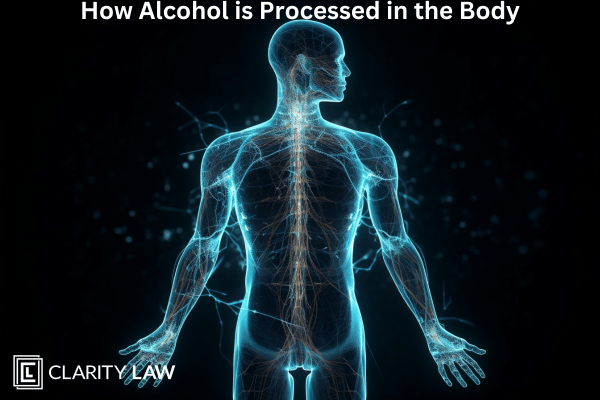
How Alcohol is Processed in the Body
Alcohol metabolism is the body's way of breaking down ethanol found in alcohol. The liver produces an enzyme called alcohol dehydrogenase, which converts alcohol into ketones. While detoxification cannot be accelerated, the efficient metabolism of alcohol may be hindered by sleep.
Since ethanol easily dissolves in water, it enters the bloodstream, affecting organs like the liver and brain. Once in the bloodstream, alcohol is broken down by alcohol dehydrogenase through sweat, urine, and breath. Drinking water or sleeping won't expedite this process. Stimulants like coffee or energy drinks won't sober you up faster; they merely mask alcohol's effects.
During sleep, oxygen levels in the blood decrease, leading to a theorized reduction in ethanol metabolism. Additional factors affecting alcohol metabolism during sleep include slower gastric emptying, as alcohol delays stomach emptying, and a lower metabolic rate, as the body's metabolism slows down during sleep. However, it's crucial to recognize that even during sleep, the liver and other bodily functions continue processing and eliminating alcohol, influenced by factors such as alcohol quantity, body weight, metabolism, and individual differences.
How fast do I sober up?
Alcohol leaves the body at an average rate of 0.015 g/100mL/hour, which is the same as reducing your BAC level by 0.015 per hour.
Factors that affect the absorption rate include sex, body size and food intake therefore the .015 level is just a very general guide.
Example: At an average rate of -0.015/hr, how long would it take someone with a BAC of 0.20 to sober up?
|
Time |
Activity |
BAC Level |
|
2:00 a.m. |
In bed. dizzy and disoriented |
.200 |
|
3:00 a.m. |
Nauseous, unable to sleep |
.185 |
|
4:00 a.m. |
Very restless |
.170 |
|
5:00 a.m. |
Sleeping, but not well |
.155 |
|
6:00 a.m. |
Sleep |
.140 |
|
7:00 a.m. |
Get up with a headache |
.125 |
|
8:00 a.m. |
Drive home, risk DUI or worse |
.110 |
|
9:00 a.m. |
At home but, trouble focusing |
.095 |
|
10:00 a.m. |
Judgment still impaired |
.080 |
|
11:00 a.m. |
Mind still foggy, fatigued |
.065 |
|
12:00 p.m. |
Not hungry, cottonmouth |
.050 |
|
1:00 p.m. |
In afternoon, still unfocused |
.035 |
|
2:00 p.m. |
Head clearing |
.020 |
|
3:00 p.m. |
Feeling a little better |
.005 |
|
4:00 p.m. |
Sober at last, but not fully recovered |
.000 |
According to the Bowling Green State University
Learn more with our article on Why are more people being arrested for drink driving in the morning?
How much can I drink before driving?
The Queensland Government still has a recommendation of the following to remain under the limit:
-
for men: no more than 2 standard drinks in the first hour, and no more than 1 every hour after that
-
for women: no more than 1 standard drink in the first hour, and no more than 1 every hour after that.
We believe this recommendation should not be followed. The common belief that a rule of two standard drinks in the first hour and one every hour after for men (and one for women) is often inaccurate. It's a guideline, not a reliable defence. Your BAC rises as soon as you start drinking, taking 30-60 minutes after you stop for it to peak.
Factors influencing your BAC reading include:
-
The actual amount of alcohol you consume. Many pre-bottled drinks and glasses may exceed one standard drink
-
Time since your last drink
-
Lack of food
-
Your body size and alcohol consumption frequency matter
-
Your health, including liver condition, sickness, or stress, can impact BAC
-
Medication may affect alcohol processing, though it's not a court defence
Contrary to popular belief, water, coffee, or food won't lower your alcohol level – only time can do that.
We have had far too many clients over the years who have followed the guidelines and still ended up with a drink driving charge.
Learn more with our article on Why the rule of thumb should not be relied on
I can’t believe I was over the limit!
It's common for clients, especially first-time drink drivers, to be surprised by their alcohol reading. In our experience, the BAC reading is often due to:
-
Stress levels
-
Not eating enough
-
Consuming stronger, non-pre-mixed drinks
-
Losing count of the number of drinks consumed
-
Miscalculating the time it takes for alcohol levels to decrease after stopping
-
Body type and amount of body fat
-
Rapid drinking
-
Any medication you are taking
-
Not sleeping for long enough
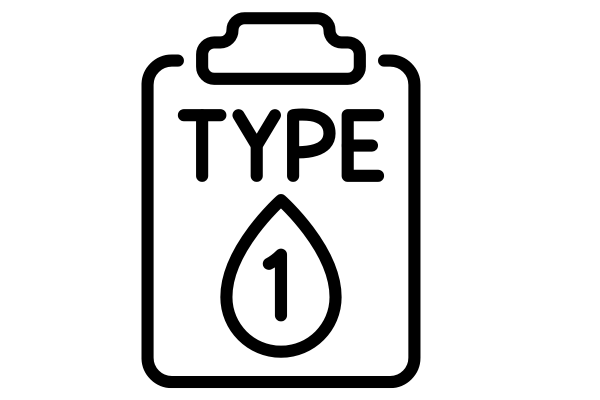
Types of Drink Driving Charges in Queensland
In Queensland in 2024 there are 4 types of drink driving charges, namely low range , mid range and high range drink driving and zero alcohol limit.
Lets look at each drink driving charge in turn.
Low Range Drink Driving
In Queensland, low-range drink driving refers to operating a vehicle with a blood alcohol concentration (BAC) between 0.05% and 0.099%.
Here are some key points about low-range drink driving in Queensland:
-
Penalties: The maximum penalties for a first offence include:
-
Licence suspension: Up to 9 months
-
Fines up to $2,167
-
Immediate suspension: Your licence will be immediately suspended for 24 hours if caught with a BAC under 0.10%.
-
Further consequences: A conviction can lead to increased insurance premiums, difficulty finding employment, and other negative impacts.
Mid Range Drink Driving
Mid-range drink driving is a more serious offence than low-range and refers to operating a vehicle with a blood alcohol concentration (BAC) between 0.10% and 0.149%. The courts consider this level of alcohol significantly impairs driving ability and poses a higher risk of accidents.
Here's what you need to know about mid-range drink driving in Queensland:
Penalties: The maximum penalties for a first offence are:
-
Licence disqualification: Between 3 and 12 months (mandatory disqualification period).
-
Fines up to $3,096.
-
Imprisonment: Up to 3 months (rarely imposed)
Additional impacts:
-
Immediate suspension: Your licence will be suspended until your court date
-
You will need to install an interlock when your disqualification period ends
High Range Drink Driving Charge
Blowing over 0.15 BAC in Queensland in 2024? You've crossed a critical line with significant legal and personal ramifications. Understanding the high range drink driving penalties is crucial:
Minimum Consequences:
-
6-month licence suspension: No work licences permitted.
-
Substantial fine: Varies based on circumstances.
Potential Additional Penalties:
-
Imprisonment: Possible if there's a crash, injury, or prior offences.
-
Probation or community service: For particularly high readings or repeat offenders.
Additional Considerations:
-
Refusal is equivalent to guilt: Refusing a breathalyser carries the same penalty as a high range conviction.
-
Mandatory Alcohol Ignition Interlock: For a minimum of 1 year, starting your car requires blowing into this device. Non-compliance extends your suspension by 2 years.
-
The police don’t have to have a blood or breath test to charge you with high range drink driving (driving under the influence). The police can charge you if you display indicia that to them shows you are under the influence of alcohol. These signs are things such as;
-
The manner of driving
-
A person physical condition and appearance
-
Behaviour and attitude
-
A person’s eyes and breathing
-
Speech
-
Coordination
-
Memory
-
Health
-
Conduct at watch house or with police
-
Zero Alcohol limit
In Queensland, the following individuals are subject to a zero alcohol limit:
-
Learner drivers (L-Platers)
-
Provisional drivers (P-Platers)
-
Drivers operating heavy vehicles
-
Drivers under 25 years old holding a probationary or provisional licence for any class of vehicle
-
People driving under a work licence
-
People who have been convicted of a traffic offence in court in the last year.

Refusing a breath or blood test
Failing to provide a breath or saliva specimen in Queensland constitutes an offence with two distinct types. One type occurs outside police stations or booze buses, often during roadside RBTs, while the other occurs specifically at police stations or booze buses.
For the roadside offence fines are likely.
Failing to provide a specimen at a police station or booze bus is treated akin to high-range drink-driving, with fines over $3,500, potential imprisonment up to 9 months, and a minimum 6-month driving disqualification for first-time offenders.
Eligible individuals charged with the roadside offence may obtain work licences, whereas no such option exists for the police station or booze bus offence.
The term "fail" encompasses more than just refusal, including insufficient or improper sample provision. For instance, ceasing to provide a breath sample prematurely or inhaling instead of exhaling into a breathalyzer could constitute a "failure."
Police possess the authority to demand breath, saliva, or blood samples if they reasonably suspect a person drove or was in control of a vehicle up to 3 hours prior. This authority extends to situations involving traffic accidents causing injury, death, or property damage.
Once requested, individuals may be taken to a police station or another suitable facility, even forcibly if necessary, for sample collection. Multiple samples may be required if deemed reasonably necessary.
Defences against such charges include proving incapacity due to illness at the time of the request, substantiated by a medical certificate. Alternatively, one can argue that the request was unlawful or that there was a valid reason, other than evading the test results, for not providing a sample.
Learn more with our article on Refusing a Breathalyser Test in Queensland
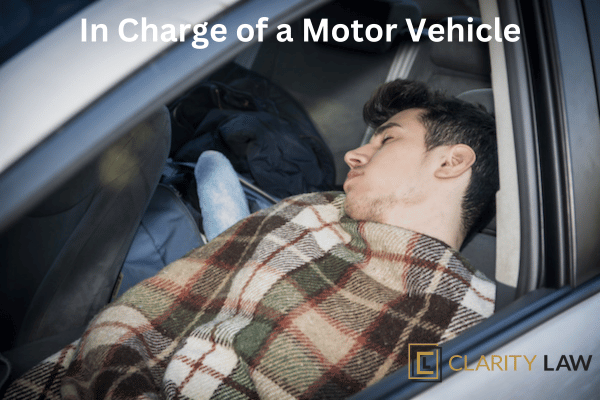
In charge of a motor vehicle
The concept of being found guilty of drink driving extends beyond scenarios where one is caught by the police while driving over the limit. Another circumstance involves being found guilty of drink driving despite not actively driving at the time, known as the offence of being in charge of a motor vehicle.
The Law:
According to the law, a person can face charges for drink driving if they are over the limit and:
-
Drive a motor vehicle; or
-
Attempt to set a motor vehicle in motion; or
-
Are in charge of a motor vehicle.
Understanding "In Charge":
The law does not precisely define what constitutes being "in charge." Instead, it relies on common sense to determine whether the individual could reasonably be considered in control of the vehicle. Common dictionary definitions include:
-
Having control or responsibility for something.
-
Holding a position of leadership or supervision.
For instance, if someone owns a car and is making a call outside of it, they could be deemed in charge. If an emergency arose requiring the car to be moved, it's likely that the car owner or the person who drove it there would take responsibility for moving it, indicating they are in charge.
Defences to a in charge offence:
Section 79(6) outlines a defence against being charged with drink driving while in charge of a vehicle. To succeed with this defence, a person must:
-
Not be seated in the driver’s seat or inside the vehicle.
-
Demonstrate an intention to refrain from driving the motor vehicle.
-
Not be too intoxicated to understand or form the intention of refraining from driving.
-
Park the motor vehicle in a way that doesn't pose a danger to others.
-
Have not been convicted of a drink driving offence in the past 12 months.
Case Examples:
-
Eggmolesse v Bruce: The Court of Appeal ruled that a mechanic, despite being intoxicated, had not intended to drive when he turned the engine on to test it after repairing his sister's car.
-
Queensland Police Service v Murray: Mr. Murray was found asleep in his car with the engine running while intoxicated. He had set the front seat back to sleep and was lying partially in front of car and partly in the back. The court analysed whether he could rely on the defence provided by section 79(6) and ultimately found him not guilty.
-
Foster v Dahl: Shirley Foster was convicted of being in charge of a vehicle while intoxicated. Despite claiming she had no intention to drive, the court found against her, emphasizing her continued control over the vehicle.
-
Brooks v Spasovski: Although intoxicated, the defendant did not intend to drive but was found guilty because he was in a position to do so without needing to take control of the vehicle from someone else.
Conclusion:
The term "in charge" is not precisely defined, and each case hinges on its unique circumstances. Despite complexities, a defence is available, but individuals must meet specific criteria, including demonstrating an intention to refrain from driving.
Learn more with our article on Can you be charged with drink driving when you did not actually drive?
Supervising a learner driver
In Queensland, the responsibility of supervising a learner driver is taken seriously, and this includes adhering to laws regarding alcohol consumption. It is illegal for a person who is supervising a learner driver to be under the influence of alcohol or drugs beyond the legal limit for driving.
The legal limit for blood alcohol concentration (BAC) when supervising a learner driver in Queensland is typically the same as for driving a car, which is usually 0.05% BAC. However, some situations may require a zero alcohol limit, especially if a heavy vehicle is involved.
Law enforcement authorities have the power to conduct random breath tests (RBTs) on supervisors of learner drivers, just as they do for regular drivers. If a supervisor is found to be over the legal alcohol limit while supervising a learner driver, they can face penalties similar to those for drink driving, including fines and licence disqualification.
The Queensland governments reasons for the law is that supervising a learner driver requires full attention and the ability to react quickly to any potential hazards on the road. Alcohol impairs judgment, coordination, and reaction time, which can significantly compromise the safety of the learner driver, the supervisor, and other road users.
Learn more with our article on Drink Driving While Supervising Learner Driver

Where can you Commit Drink Driving?
Its not just roads where you can be arrested for drink driving in Queensland in 2024.
Drink driving on private property
There's a lot of confusion about whether you can get a drink driving charge in Queensland if you're not on a public road. Maybe you've heard you can't be breathalysed in your driveway, or that it's okay to have a few drinks and then park in your garage.
The truth is, the law in Queensland is pretty clear: you can be charged with drink driving anywhere, even on private property like your driveway or a car park.
Here's how it works:
- The police need to prove three things to get a conviction:
-
You had alcohol in your system.
-
You were driving or in charge of the vehicle.
-
The offence happened somewhere (including your driveway!).
The law says drink driving can happen "on or upon a road or elsewhere." The key word is "elsewhere." That means anywhere that's not a road (drink driving on the road is still illegal obviously), like your driveway or a shopping centre car park.
There was even a court case about this:
-
A driver named Jovanovic was driving home and pulled into his driveway.
-
The police saw him and asked him to take a breath test.
-
Jovanovic refused, saying, "I'm in my driveway, you can't get me!"
-
He was ultimately charged with refusing a breath test, which is the same as a high-range drink driving offence in Queensland.
-
The judge said that Jovanovic could be charged even though he was on private property.
So, the bottom line is:
-
Even if you're parked in your driveway, you can still be charged with drink driving.
-
The same goes for private car parks, shopping centres, and anywhere else.
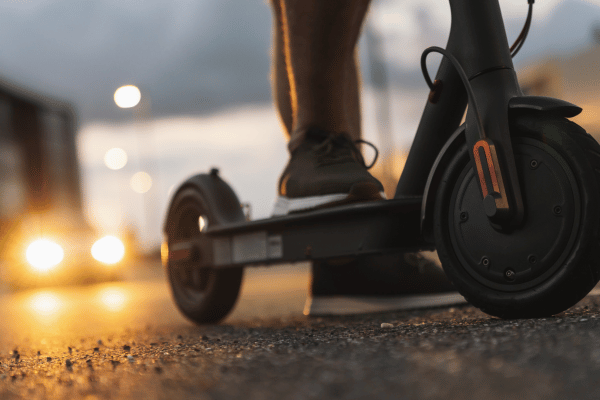
Electric scooter
The proliferation of electric rideables on Queensland roads in 2024 has introduced a new dimension to traffic enforcement, with an increasing number of individuals facing court appearances for drink-driving offences while operating these devices. While electric scooters are permitted for use in Queensland under strict regulations, including age restrictions, helmet requirements, and prohibitions on mobile phone use and carrying passengers, the most crucial rule is the prohibition against operating them while under the influence of alcohol or drugs.
Despite the absence of a specific offence for drink-driving on electric scooters, Queensland's traffic legislation broadly encompasses any vehicle propelled by non-motorized means, including electric scooters, under its definition of "vehicle." The offence extends to both driving and being "in charge" of such devices, with the latter term interpreted broadly to encompass any ability to control the vehicle without necessarily having physical possession of it. Conviction for this offence carries significant penalties, including fines of up to $5,222.
The question of licence disqualification adds complexity to these cases. While the legislation does not mandate a mandatory disqualification period for this offence, the court retains the discretion to impose licence disqualification for offences involving interference with the operation of a motor vehicle. However, defining electric scooters as "motor vehicles" for the purpose of disqualification is contentious, as the legislation explicitly excludes them from this category. The court's decision to impose licence disqualification hinges on whether the offence constitutes an abuse of the privilege of driving, a determination that may vary depending on the specific circumstances of each case.
As electric scooters become a commonplace mode of urban transportation, the legal landscape surrounding offences committed on these devices is likely to evolve.
Boat
In Queensland, the laws regarding drink driving also extend to operating a boat, jet ski, or any other marine vessel while under the influence of alcohol or drugs. This offence is commonly referred to as "drink driving on a boat" or "boating under the influence (BUI)." The legal limit for blood alcohol concentration (BAC) when operating a vessel is generally the same as for driving a car, typically 0.05% BAC for recreational boaters and 0.00% for commercial vessel operators, skippers under 18 years old, and those supervising learners.
The Queensland Police Service has the authority to conduct random breath tests (RBTs) on watercraft operators, similar to roadside RBTs for drivers. They can stop and board vessels to ensure compliance with boating safety regulations, including alcohol and drug laws.
Penalties for drink driving on a boat in Queensland can include fines, loss of boating privileges, imprisonment, and disqualification from operating a vessel. The severity of the penalty may depend on factors such as the level of intoxication, any previous offences, and whether the incident resulted in accidents, injuries, or fatalities.
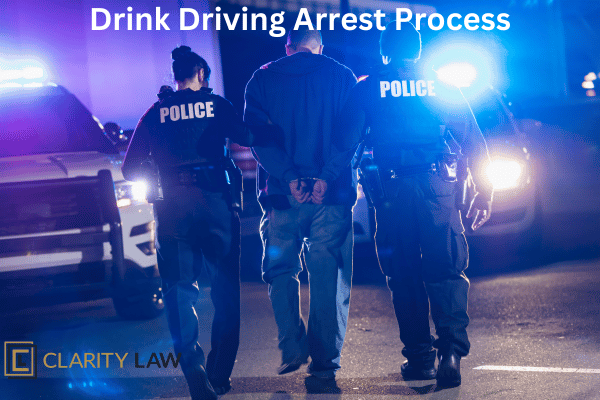
Drink Driving Arrest Process
Facing an arrest for drink or drug driving can be incredibly distressing, leaving you feeling overwhelmed. Knowing the necessary steps to safeguard your rights and ensure a fair legal process is crucial.
Let's delve into the details and shed light on your next steps. Handling the situation strategically and seeking proper legal guidance is essential. Here are the steps you should consider:
-
Stay calm and cooperate with authorities: When pulled over and arrested for drink driving, maintaining composure and cooperating with authorities is paramount. Losing your temper or resisting arrest can complicate matters further. Remember, keeping a level head will aid in making sound decisions going forward.
-
Exercise your right to remain silent: As the police question you about the incident, it's important to assert your right to remain silent. You have the right not to incriminate yourself. Politely inform the officers that you'd like to consult with your lawyer before answering any questions or invoke your right to silence, answering only what's necessary. This simple step can prevent inadvertently saying something that could be used against you later.
-
Provide necessary information to the police: You'll need to provide your name, address, date of birth, and show your driver's licence if asked by the police.
-
Provide a sample of breath or blood: Refusing or failing to provide a specimen of breath for analysis is an offence. This refusal can lead to severe consequences, including being considered for a high-range drink driving charge (DUI). Police have the authority to request breath, saliva, or blood samples if they reasonably suspect you've driven a vehicle within the last three hours.
Will I need to go to court for Drink Driving?
Yes, you will be required to attend the court.
What paperwork might the police give you?
Generally the police will give you a notice to appear in court or you will be given bail by them to that date. If you have other traffic offences that previously went to court then they also might serve on you a notice to allege previous offences.
What should I do next?
-
Seek legal representation: Consulting a reputable traffic law firm who are experts in drink driving cases in Queensland is crucial. Experienced lawyers can guide you through the legal process, protect your rights, and aim for the best possible outcome.
-
Understand the consequences: Knowing the potential penalties associated with the charges is essential. Drink driving offences in Queensland carry significant consequences, including fines, licence disqualification, mandatory courses, and even imprisonment in severe cases.
-
Attend court hearings and comply with requirements: It's vital to attend all court hearings and fulfill any court-set requirements, especially bail conditions. Failure to do so can lead to additional penalties and negatively impact your case.
-
Consider rehabilitation programs: Voluntarily attending rehabilitation programs can demonstrate your commitment to addressing substance abuse issues, potentially influencing the court's decision.
-
Complete a traffic course: Complete a traffic offenders program like QTOP
-
Negotiate with the prosecutor: Based on the evidence and circumstances of your case, your lawyer may negotiate with the prosecution or represent you in court to seek a favourable outcome.
Remember, seeking legal representation is highly advisable for drink driving charges. Experienced lawyers possess extensive knowledge of the legal system and can significantly improve your chances of a favourable outcome. By understanding the consequences, seeking proper guidance, and fulfilling your obligations, you can navigate the legal process effectively.
Learn more with our article on Arrested for Drink or Drug Driving: What Should I Do Next?
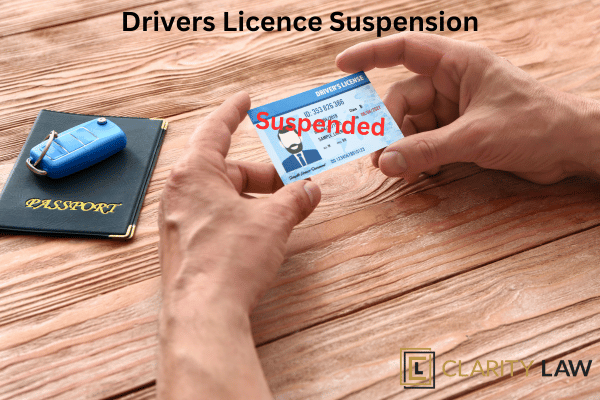
Immediate Suspension of licence for Drink Driving
Among the paperwork the person is given, will be a form titled a “Notice of Suspension or Disqualification”. This form will have one of two sections filled in depending on the reading of alcohol or level of impairment.
Queensland's drink driving legislation categorizes offences into three levels:
-
Low Range: Blood alcohol readings between .05 and .099
-
Mid Range: Blood alcohol readings between .1 and .149
-
High Range: Blood alcohol readings above .15
Each level of offence corresponds to different immediate licence suspension periods by the police.
Duration of suspension
Low-Range Offences: Individuals facing low-range charges experience a 24-hour prohibition on driving following their arrest.
Impact of Immediate Suspension:
- For low-range offenders, the 24-hour suspension typically has minimal impact.
- Mid-range and high-range offenders face significant disruptions to work and personal life due to the inability to drive for an extended period.
Mid-Range and High-Range Offences: Those charged with mid-range or high-range drink driving immediately lose their driving privileges until the court imposes a disqualification.
Additionally, failing to provide a breath or blood specimen to the police, or being charged with dangerous operation of a vehicle while under the influence, leads to licence suspension until the court date.
Possibility of Suspension Removal
A person challenging a drink driving charge or applying for a work licence can seek an immediate return of their licence through a Section 79E Application to the court. This option is particularly beneficial when the court date for the application is along time in the future.
Difference between suspension and disqualification
When a person’s licence has been suspended, that means that their authority to drive a vehicle has been temporarily withdrawn.
A disqualified licence, in contrast to a suspension is the ‘permanent’ (meaning the licence does not automatically come back at the end of the period of disqualification) withdrawal of a person’s authority to hold or obtain a driver licence. The only way in which a person can be disqualified, is by an order of the court.
79E application (emergency licence)
When your licence is suspended life doesn’t stop. There are times when you need to drive during your suspension to make a living.
An Emergency Licence (section 79E licence) lets you drive under specific conditions during your suspension. Think of it as a temporary permit to drive for work until the court deals with your drink driving charge.
Who can apply?
You must have;
-
Held a current QLD open licence at the time of the offence.
-
Not disqualified or suspended in QLD in the past 5 years (except SPER suspension that didn't go to court).
But you need to act fast! You must apply within 21 days of your licence suspension.
What do you need?
-
Affidavit from you and your employer (if driving for work).
-
Explain your hardship: how not driving hurts you or your family (financially or otherwise).
-
Fill out the Section 79E Application Form.
Important:
-
The matter must go before the court
-
The court decides based on your affidavits and history
-
The court can restrict how you use the licence (times, purposes, vehicles)
Remember:
-
This is not a guilty plea its only temporary until the court deals finally with your drink driving charge.
-
Its best suited for mid range drink drivers who are suspended until their court date but need to keep driving before the court hears the matter or the work licence application.
Learn more: We have a full article on All you need to know about section 79E applications
Driving during suspension
So what would happen if you are caught driving while your licence is suspended?
Driving while suspended in Queensland is a huge deal. The courts don't mess around, and the penalties are harsh:
-
24-hour suspension: Drive during this short suspension, and you'll lose your licence for 6 months.
-
Longer suspension: Drive while suspended for more than 24 hours, and you're looking at 2 to 5 years without a licence!
Learn more: We have a full article on driving under a police suspension

How Does the Court Hear a Drink Driving Charge?
All drink driving charges in Queensland are heard in the court closet in jurisdiction to where the drink driving offence occurred.
You can find the list of all courthouse contacts.
Different Magistrates Courts across Queensland handle drink driving cases either independently or as part of a broader criminal law call-over, depending on their size and resources. For instance, larger courts like the Brisbane Magistrates Court may have dedicated traffic courtrooms, while smaller regional courts might hear drink driving charges alongside more serious criminal offences.
Upon being charged, individuals receive a court date and are instructed on the time they should appear. Although court attendance is mandatory at the designated time, cases are not heard immediately. Instead, the court and the police prosecutor coordinate the order of proceedings for the day.
In court, those with legal representation are typically heard first, followed by self-represented individuals. This process varies slightly between courts but generally prioritizes legal representation. However, Magistrates have the discretion to decide how and when matters are dealt with in their courtroom.
First Court Date Proceedings
During the first court appearance, defendants or their solicitors (the solicitors should have obtained a copy of the QP9 before the court date) interact with the police prosecutor to obtain a copy of the police's court brief, known as a "QP9." This document outlines the charge, facts alleged by the police, criminal and traffic history, and includes the breath analysis certificate. Defendants are advised to review these documents carefully, especially if considering a guilty plea.
Defendants are not obligated to enter a plea on the first court date and are entitled to seek legal advice. If discrepancies are identified in the police's outline of facts or the defendant's history, the court may grant an adjournment for further discussion. Alternatively, if a work licence is required, the court may adjourn the matter to a special hearing day.
Pleading Guilty to Drink Driving
If a defendant pleads guilty, the court proceedings commence immediately. The Magistrate reads the charge and confirms the plea, after which the police prosecutor outlines the facts and may recommend penalties. Defendants or their solicitors then present mitigating factors to minimise penalties, considering legislation dictating penalty considerations.
Following these submissions, the Magistrate may seek clarification and then proceeds to convict the defendant, imposing penalties such as fines, community service, or probation, along with a driving disqualification. If a work licence is granted, conditions are outlined, and the defendant must surrender their driver's licence if disqualified.
Pleading Not Guilty
Defendants pleading not guilty have their matters adjourned for a hearing, during which the prosecution prepares a brief of evidence. Summary hearings are scheduled, with timelines varying based on court size and caseload. These hearings adhere to strict rules of evidence, with specific procedures for challenging breath analysis equipment accuracy.
Defendants planning to contest the charge are advised to seek legal advice and representation to maximize their chances of success at the hearing. Proper legal representation is crucial to navigating the complexities of the legal process and presenting a robust defence.
How do I find the court I am suppose to be in?
The notice to appear will contain the court you are to attend. You can check the courts website for the address of the court.
Arriving at Court
Always check the parking situation around the court so that you can arrive when the court opens at 8:30am. You will need to go through security and in larger courts like Beenleigh, Southport or Brisbane can take some time.
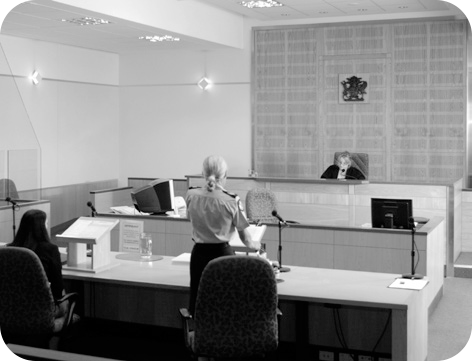
Who will be in court?
You are likely to see the following people in the court room;
Magistrate – Essentially the Judge who rules on all the cases
Court Clerk – The court staff member assisting the Magistrate
Police Prosecutor – The person prosecuting the drink driving charge on behalf of the Queensland Government
Gallery – The people in the court with court matters or who are just watching the court proceedings like reporters
Defence Lawyers – The lawyers engaged by people to help people through the court process and who tries to get the best outcome for their clients
Can I bring a support person?
Absolutely. They won’t be able to talk for you to the Magistrate but they can be there to support you,
How long will this take?
How long will you need to be at court for your drink driving matter to be heard? It really depends on how many cases there are that day.
Generally the court will go in the following order
-
Adjournments by people with lawyers
-
Adjournments by people without lawyers
-
Guilty pleas for people with lawyers
-
Guilty pleas for people without lawyers
People should generally assume it will take most of the morning for their drink driving charge to be dealt with.

What should I wear to court?
First impressions matter, especially in a courtroom setting where judgments can be swift and influenced by various factors. Knowing what to wear to court can potentially impact how you're perceived by the Magistrate and other courtroom personnel. Dressing appropriately demonstrates respect for the legal proceedings and can reflect positively on your character and attitude towards the charges you're facing.
When selecting your attire for a court appearance, it's crucial to opt for clothing that is conservative, neat, professional but comfortable. Aim for clothing typically worn in professional settings, such, dress shirts, and trousers/skirts. Solid colours or subtle patterns are preferable over flashy or loud designs. You don’t necessarily need to wear a suit but if you are comfortable in a suit that would be the most appropriate thing to wear.
Aim to wear no less than what you would wear to a job interview.
While comfort is important, avoid overly casual clothing like t-shirts, jeans, shorts, or sneakers. Opt for closed-toe shoes and avoid excessive jewellery or accessories. If you have visible tattoos or piercings, consider covering them if possible, as they may distract or prejudice certain individuals in the courtroom.
The focus should be on your case, not your attire.
If unsure about what to wear, consult with your lawyer for guidance. Remember lots of defendants will not dress appropriately. Aim to be one that does and show you are taking your charges seriously, the Magistrates appreciate the effort you would have put in to dress appropriately for court.
Learn more: We have an article on What to wear to court
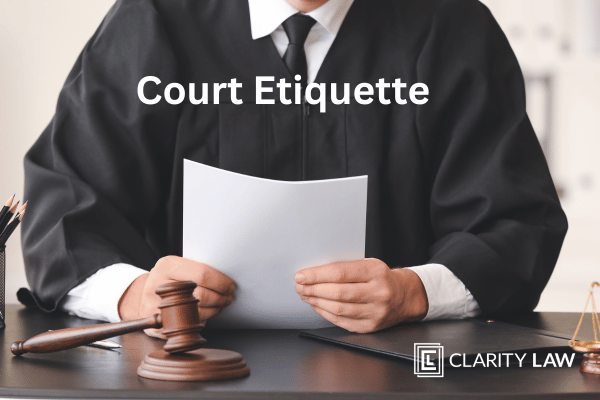
Court Etiquette
Facing a drink driving charge in Queensland can be a stressful and overwhelming experience. As you prepare for your court appearance in 2024, it's essential to understand and adhere to proper courtroom etiquette. Here's a comprehensive guide to help you navigate the legal proceedings with confidence and respect:
-
Arrive Early: Plan to arrive at the courthouse well before your scheduled appearance time. This allows you to find parking, go through security checks, and locate the correct courtroom without rushing.
-
Dress Appropriately: Dressing conservatively and professionally is crucial. Opt for business attire such as dress shirts, trousers/skirts, and closed-toe shoes. Avoid casual clothing like t-shirts, jeans, or sneakers, as they may convey a lack of respect for the court.
-
Follow Instructions: Listen carefully to instructions from court staff and follow their guidance regarding where to sit and when to stand. Remain quiet and attentive while court is in session, refraining from using electronic devices or engaging in disruptive behaviour.
-
Show Respect: Treat everyone in the courtroom with respect, including the magistrate, court staff, lawyers, and other individuals present. Address the magistrate as "Your Honour" and avoid interrupting or speaking out of turn.
-
Stay Calm and Composed: Court proceedings can be emotionally charged, but it's essential to remain calm and composed. Avoid displaying negative emotions such as anger or frustration, as this may reflect poorly on your character.
-
Speak Clearly and Honestly: If called upon to speak, do so clearly and honestly. Answer questions directly and avoid providing unnecessary information. Remember that honesty is key to building credibility with the court.
-
Listen to Legal Advice: Trust the guidance of your lawyer and follow their advice throughout the proceedings. They are experienced in navigating the legal system and can provide valuable insights tailored to your case.
What if I’m sick on the day of court?
Contact the court and explain the situation. Depending on the circumstances the court may require you to provide a medical certificate or appear by phone. Different courts will have different approaches to people who are sick on their court date, so what occurs in one court may not occur in another.
Learn more with our article on what to do if you miss your court date
Can I just appear by phone?
It is unlikely that unless you normally live overseas or in another state you will be able to appear by phone.
The best way to check is to contact the court registry and discuss it with them.
When does the disqualification start?
As soon as the Magistrate orders the disqualification it starts. This means you can’t drive away from the court so arrange some other way to get home after court.
What should I bring?
You should bring your driver’s licence if applicable and if you attended a course like QTOP then a copy of your attendance documents.
Do I Get to keep my Physical Licence?
No, if you plead guilty to drink driving you are required to surrender your licence to Queensland Transport by the day after the court disqualifies you or to the Police Prosecutor at the court.
The surrender of your licence may in some circumstances deprive you of your main form of identification, you may therefore wish to attend Queensland Transport before the court date and obtain a proof of age card to help with identification during your period of disqualification.
Offender Levy
As from 21 August 2012 all people who plead guilty or are found guilty in the Magistrates Court must pay (currently $133.60) in addition to any penalty imposed by the Magistrate. The court has no power in regards to the levy and SPER will contact you in regards to payment. The levy is separate from any monetary penalty the Magistrate may impose.
More details can be found on the SPER Website
What happens after my disqualification period?
After the period of disqualification has ended you will need to attend Queensland Transport and reapply for your licence. You cannot simply start driving after your disqualification period has ended. Please don’t drive to Queensland Transport as you are not entitled to drive until after you have been to Queensland Transport and obtained your licence back. Also remember to bring 100 points of ID.
After you have been disqualified you will be on a probationary licence for 1 year, this means that;
-
You have only 4 demerit points available
-
You have a zero alcohol limit for 1 year
Queensland Transport now require that you do a course in order to obtain your licence. If this is your first drink driving charge or if you have other drink driving charges but they occurred before 10 September 2021 then you need to do a short online course. Details can be found here
If this is your second or more drink driving charge and any previous drink driving charges occurred after 10 September 2021 then you need to do a more intense course. Details can be found by clicking here
During your disqualification you cannot drive any motor vehicle for any reason. If you do drive then you can be charged with disqualified driving which is a serious charge.
Will people find out I have been charged with drink driving
There is no central database that someone can look up that shows the public people who have been convicted of drink driving.
There is a court date lookup portal that people can access if they have a persons name and date of birth but this only lists upcoming court dates and does not list the actual charges.
However a reporter can report on what occurs in a court and they could publish the name and details of any drink driving matters.
Learn more: We have a full article on How do I find my court date?
Learn more: We have a full article on Can I ask the Court to close for my sentence?
Can I transfer the charge to another court?
Yes it may be possible to transfer to the court closets to where you live. The transfer however can only occur if you are pleading guilty.
Transfers are often done where the drink driving charge is in a court many hours away from where you live.
It is not possible to transfer a drink driving charge to another state. If you live in another state it might be possible to have a lawyer appear in court on your behalf and with you appearing by phone.
Learn more: We have a full article on How drink driving matters are heard in Queensland

Penalties for Drink Driving in Queensland in 2024
In Queensland, the penalties for drink driving are multifaceted and influenced by various factors. Here's an overview of what you can expect:
Mandatory Licence Disqualification
-
Universal Disqualification: Every individual charged with drink driving in Queensland will lose their driver's licence. Courts do not have the discretion to opt out of this penalty.
-
Exceptional Circumstances: In certain situations, individuals may apply for a work licence to mitigate the impact on their employment.
Factors Influencing Disqualification Period for Drink Driving
Blood Alcohol Concentration (BAC) Reading
- Your BAC reading significantly influences the penalty imposed by the court. This reading is measured in grams of alcohol per 100 millilitres of blood.
Accident Involvement
- In the event of an accident, particularly if it resulted in damage to property or injury to others, the penalty escalates.
Presence of Passengers
- Having passengers in the vehicle, especially minors, can exacerbate the penalty.
Purpose of Driving
- The reason for driving, such as urgent necessity versus knowingly driving while over the limit, affects the severity of the penalty.
Traffic and Criminal History
- Past traffic and criminal offences, especially previous drink driving charges within the last 5 years, increase the penalty.
Personal and Work Situation
- The impact of disqualification on personal and work life is considered, though obtaining a work licence may not always be feasible.
Completion of Driving Courses
- Undertaking driving courses before sentencing, like the Queensland Traffic Offenders Program (QTOP), can mitigate the penalty.
Judicial Discretion
- The Magistrate overseeing the case may have varying views on appropriate penalties, highlighting the importance of legal representation familiar with local courts.
Potential Disqualification Periods
See the table below for minimum and maximum licence disqualification periods applicable to first-time drink drivers.
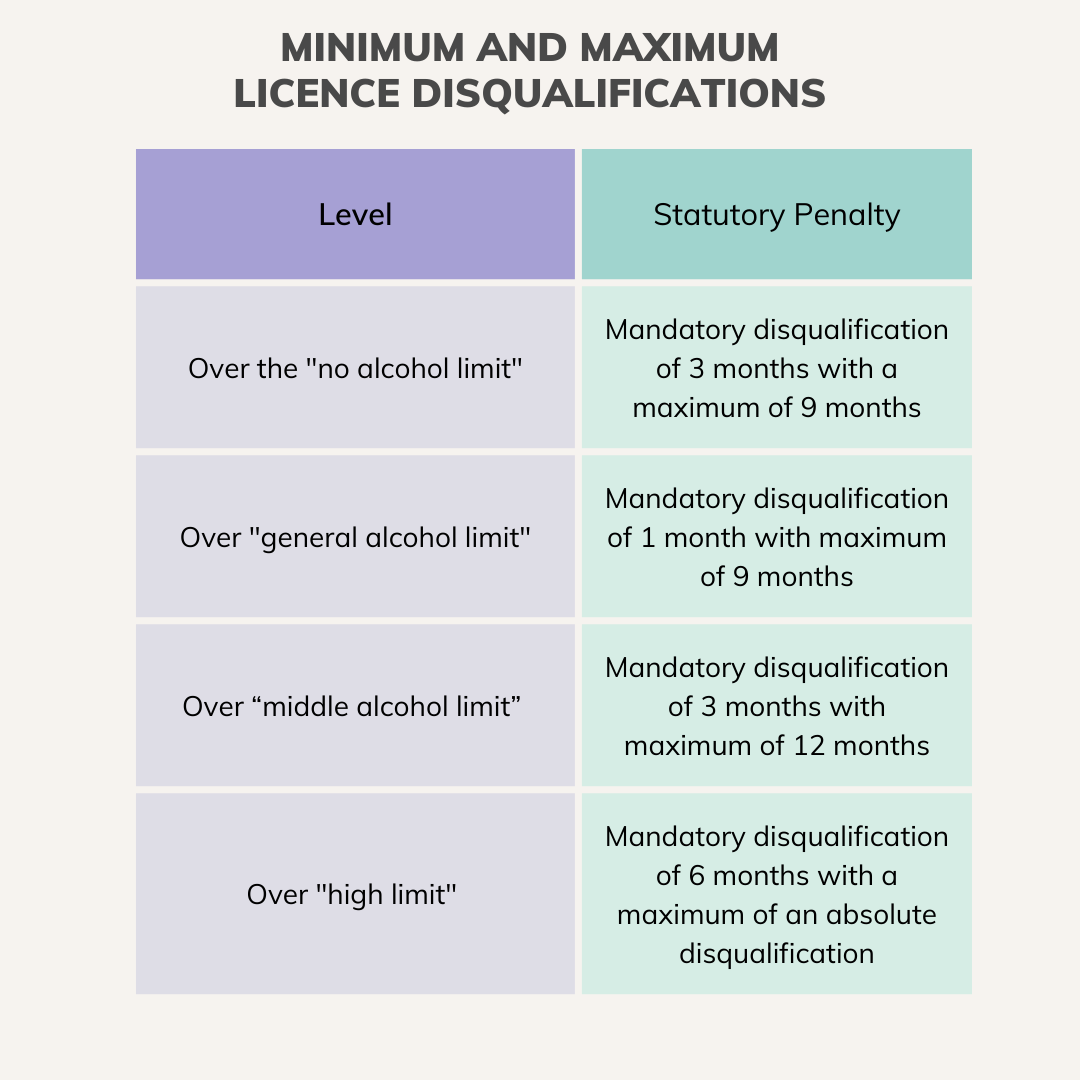
Specific Penalties for Different Drink Driving Offences
See the table below for possible disqualification periods for first-time drink drivers on an open licence charged with low or mid range drink driving.
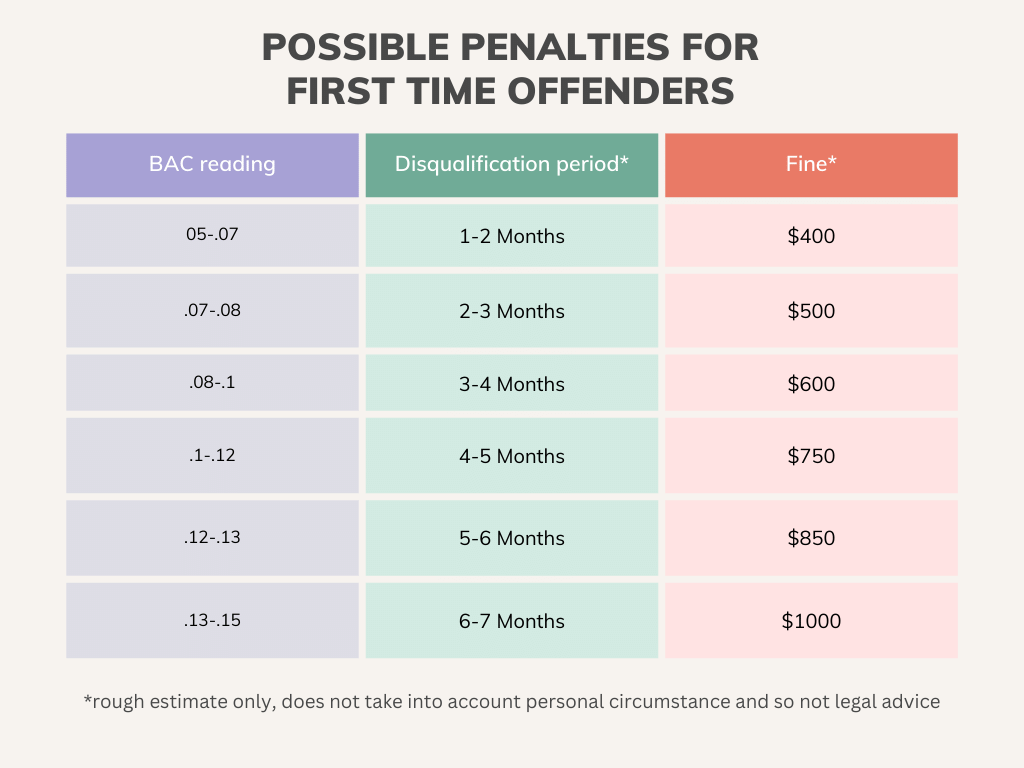
See the table below for possible disqualification periods for first-time drink drivers on an open licence charged with high range drink driving.
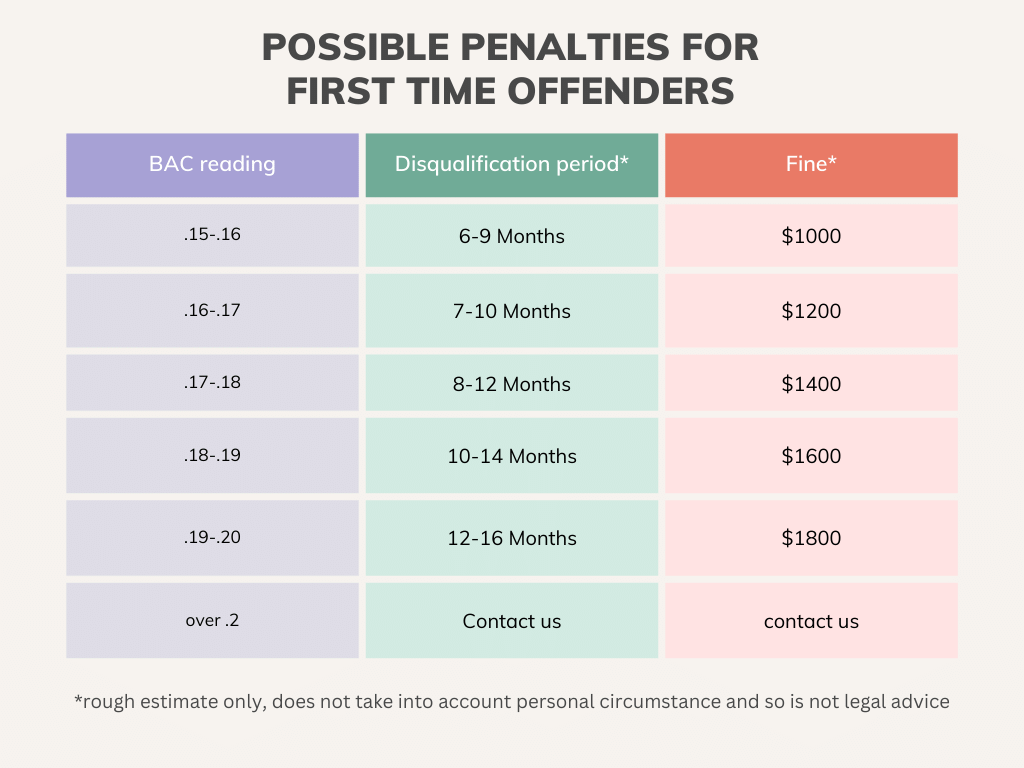
Will I lose my licence?
In Queensland unlike other Australian states there is mandatory periods of disqualification for all drink driving offences. It does not matter what a person's circumstances are, their driving history or any other factors, if they are charged with drink driving and plead guilty there must be a mandatory period of disqualification.
The only thing a person could possibly do is apply for a work licence to continue to drive for work reasons only during the mandatory disqualification.
Surely the magistrate can take pity on me and not take my licence away?
If you are charged with drink driving the magistrate has no discretion as to whether they will take your licence away, they must. The idea is to get the disqualification period down as much as possible or get work licence.
Learn more: We have a full article on Do I really need to lose my licence for drink driving?
I’ve heard you can ask for a Section 10 and not lose your licence
Section 10 is New South Wales law and does not apply in Queensland.
Learn more: We have a full article on Why section 10 does not apply in Queensland

Late-Night Driver Restrictions
Late-night driver restrictions, also known as night-time driving curfews, involve limitations on driving privileges during specific hours, typically during the late night. These restrictions are implemented to reduce the occurrence of road accidents and fatalities, focusing on times when factors such as reduced visibility and increased fatigue are prevalent.
In Queensland, late-night driving restrictions primarily target provisional licence holders under the age of 25, including P1 and P2 drivers. These restrictions are applied whenever a P licence holder under 25 commits a drink driving charge.
Duration and Timing of Late-Night Driving Restrictions
Late-night driving restrictions in Queensland typically apply for a duration of one year. These restrictions are enforced between the hours of 11 pm and 5 am.
Exemptions from Late-Night Driving Restrictions
Certain circumstances may warrant exemptions from late-night driving restrictions in Queensland. Eligibility for an exemption requires demonstrating a genuine need to drive during late-night hours, such as for employment purposes. Examples include essential employment obligations or significant financial hardship resulting from the inability to drive during restricted hours.
Learn more: We have a full article on Late Night Driver Restrictions in Queensland

What Can I do to Reduce the Penalty for Drink Driving?
The most effective things you can do before your court date is to complete a Traffic Offender Program, get character references, get a good drink driving lawyer and if appropriate get medical help for any drinking issues.
Lets look at them in turn.
Traffic Offender Programs
When facing a traffic offence charge in Queensland, one common question that arises early on is whether it's necessary to complete a traffic offenders course before going to court. The answer, as with many legal matters, is not straightforward and depends on various factors. If you're in this situation, understanding your options and the potential benefits of completing such a course can be crucial. Here's what you need to know about traffic offenders courses and how to choose the right one for your situation.
Understanding Traffic Offenders Courses: A traffic offenders course is a short program designed to provide individuals facing traffic offence charges, such as drink or drug driving, with insight into their offence, the associated risks, and the court system. Completing such a course, often available online, can result in a completion certificate that may be presented in court to potentially reduce penalties or support applications for work or hardship licences.
Available Programs: Several traffic offenders programs are available, including the Queensland Traffic Offenders Program (QTOP) and others like the Traffic Offenders Intervention Program and Traffic Offenders Rehabilitation Program. These programs aim to educate participants about their offences and reduce the likelihood of reoffending.
Eligibility and Requirements: In general, these programs are open to anyone wishing to complete them without specific eligibility criteria. However, some programs may have technological requirements for online completion. It's essential to confirm any prerequisites before enrolling.
Benefits of Completing a Program: While completing a traffic offenders course is not mandatory, it can have benefits, especially in certain circumstances. While it won't result in harsher penalties for non-completion, it may positively influence sentencing outcomes, particularly regarding disqualifications or restricted licence applications. Magistrates may also view completion favourably as a sign of taking the matter seriously.
Choosing the Right Program: Selecting the most suitable program involves considering factors such as cost, format (online or in-person), convenience, and reputation. While costs typically range from $200 to $250, the format can vary, with some offering in-person sessions and others being entirely online. The QTOP program, being one of the oldest and most respected, is often recommended by legal professionals for its credibility and effectiveness.
Final Considerations: Ultimately, whether to complete a traffic offenders course is a personal decision, but it's one that should be made with careful consideration of its potential impact on your case. While legal advice may guide you, the choice remains yours. Additionally, completing such a program does not replace the mandatory Department of Transport and Main Roads drink driving program required to regain your licence.
Learn more: We have a full article on Traffic Offender Programs

Court Character References
When facing a drink driving charge, the role of character references in court cannot be overstated. These references offer a window into the defendant's character, aiding judges and legal professionals in understanding the person beyond their charges. Choosing the right individual to vouch for your character is pivotal, as their credibility and insight can significantly sway the court's perception. In this article, we'll delve into the qualities that make someone the ideal candidate for providing a character reference in a drink driving case.
Key Qualities in a Character Reference:
-
Personal Connection: The ideal referee should share a close and personal relationship with the accused, possessing intimate knowledge of their character, values, and behaviour.
-
Professional Standing: References from employers, supervisors, or colleagues can carry weight, especially if the alleged offence contrasts with the defendant's professional conduct.
-
Community Involvement: Individuals involved in community activities or volunteer work can offer compelling character references, highlighting the defendant's positive contributions to society.
-
Legal Knowledge: Referees with a solid understanding of the legal system and courtroom proceedings can effectively articulate the defendant's character within a legal context.
-
Impartiality: It's crucial to select someone capable of presenting an objective perspective, showcasing both positive and negative aspects of the defendant's character responsibly.
Relevance of Character References in Drink Driving Cases
Character references can be particularly beneficial in various drink driving cases, providing the court with additional context about the defendant's character and behaviour. Here's how they can assist in different scenarios:
-
Demonstrating Responsibility: References can present evidence of the defendant's responsible behaviour and commitment to sobriety, potentially influencing sentencing outcomes.
-
Highlighting Rehabilitation Efforts: References can showcase any steps taken by the defendant towards rehabilitation or counseling, emphasizing their dedication to addressing the issue.
-
Supporting Licence Applications: In cases involving work licences orders, character references can underscore the defendant's understanding of traffic laws and efforts to comply with legal requirements.
Crafting an Effective Character Reference
When composing a character reference for court, certain elements should be included:
-
Referee Details: Full name, address, and relationship to the defendant.
-
Character Assessment: Opinion on the defendant's character, behaviour, and likelihood of re-offending.
-
Relevance to the Offence: Discussion of the impact of the offence on the defendant's attitude and behaviour, along with any expressions of remorse.
-
Specific Examples: Providing specific instances or anecdotes that illustrate the defendant's positive attributes and responsible behaviour.
-
Easy to Read: Be typed and ideally no more than 1 page.
Final Considerations
-
Attendance in Court: While referees are generally not required to attend court, they may choose to do so.
-
Confidentiality: Court references become public documents once handed to the court, so any confidentiality requests should be communicated accordingly.
-
Addressing the Reference: It should be addressed to "The Presiding Magistrate" at the relevant Magistrates Court, clearly stating the referee's qualifications and reasons for belief in the defendant's good character.
In conclusion, selecting the right character reference is crucial in presenting a comprehensive and honest portrayal of the accused in a drink driving case. By prioritizing individuals who can offer valuable insights and unbiased perspectives, defendants can enhance their chances of presenting a compelling case in court.
Learn more: We have a full article on Character References for Traffic Charges
Medical help
For individuals facing a drink driving charge, seeking medical help for alcohol dependency issues can prove instrumental in mitigating penalties in court. While the legal consequences of a drink driving offence can be severe, demonstrating a proactive approach towards addressing underlying alcohol-related issues can significantly impact sentencing outcomes.
Acknowledging the Issue
First and foremost, acknowledging the presence of alcohol dependency and taking steps to address it is crucial. By recognizing the need for intervention, individuals exhibit accountability for their actions and a willingness to confront the root cause of their behaviour.
Positive Impression on the Court
Courts are often receptive to defendants who demonstrate genuine remorse and a commitment to rehabilitation. Seeking medical assistance for alcohol dependency sends a powerful message to the court, indicating a proactive effort to address the problem and prevent future occurrences of drink driving.
Impact on Sentencing
When considering sentencing options, courts take into account various mitigating factors, including the defendant's efforts towards rehabilitation. By participating in alcohol treatment programs, counselling sessions, or support groups, defendants can present compelling evidence of their commitment to change, potentially leading to reduced penalties or alternative sentencing options.
Final Thoughts
In drink driving cases, obtaining medical help for alcohol dependency can significantly influence sentencing outcomes. By acknowledging the issue, seeking assistance, and actively participating in treatment programs, defendants can demonstrate accountability, remorse, and a genuine commitment to change. Ultimately, taking proactive steps towards addressing alcohol-related issues not only benefits individual well-being but also enhances the prospects of a favourable outcome in court.
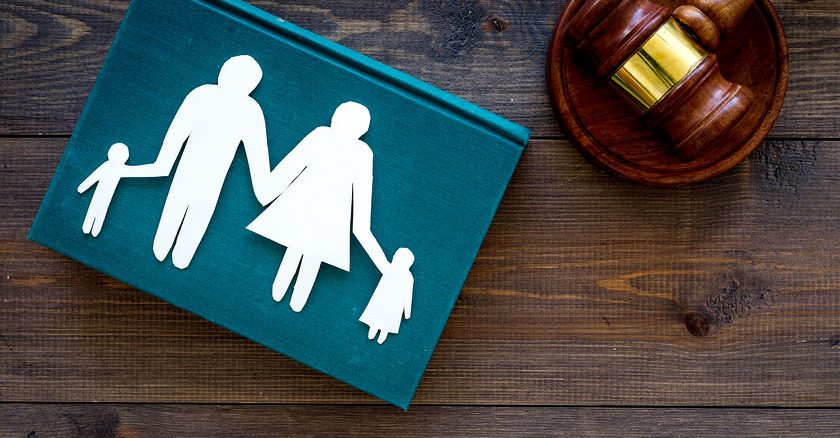
Drink Driving Charge in the Children Court
Various offences under Queensland law lead to mandatory or discretionary licence disqualifications.
For instance, an adult charged with high-range drink driving must lose their licence for a minimum of 6 months, with no possibility of reduction by the court. However, if an adult faces charges of careless driving, the court may exercise discretion regarding licence disqualification. It's important to note that the court recognizes the need for a different approach when dealing with individuals under 18 in traffic offence cases.
The Youth Justice Act governs how the Children’s Court handles offences committed by minors (those under 18years old) . According to this legislation, if a child is found guilty of an offence that would result in licence disqualification for an adult, the child must face a similar disqualification.
However, there are several avenues to avoid this outcome.
One way to avoid disqualification as a child is if the police caution or refer the child to restorative justice for an offence that could have led to disqualification. Additionally, if the child is under 17 and a conviction is not recorded for a disqualifiable offence, disqualification may be avoided. Furthermore, if the magistrate refers a child to restorative justice for an offence that the police should have referred to, there will be no disqualification.
Restorative justice involves a conference between the child who committed the crime and those affected by it. The purpose is to discuss the incident, its impact, and ways to repair the harm caused to the victim.
Learn more: We have a full article on Licence Disqualifications in the Children’s Court
This Isn’t My First Drink Driving Charge
In Queensland, if you're caught drink driving, your licence will likely be suspended for a period, and you'll usually face a fine. Some people can apply for a work licence, which allows driving for work purposes only, lessening the impact of the suspension. However, this option isn't available to everyone, and it doesn't permit driving for personal reasons.
Having a previous drink driving offence within the last 5 years can lead to harsher penalties and may disqualify you from obtaining a work licence.
Increased Penalties
For most drink driving offences, there's a range of penalties set by law. High range drink driving, for instance, carries a minimum disqualification of six months for a first-time offender, with the maximum left to the discretion of the Magistrate. If you have a previous offence within the last 5 years, the penalties increase.
For example, a first-time offender caught with a low-range reading of 0.065 might face a minimum disqualification of one month and a maximum of 9 months. But if they commit the same offence three years later, they could face a minimum of 3 months and a maximum of 12 months.
The severity of the previous offence also matters. If it was a high-range offence, the penalties are even harsher.
Inability to Obtain a Work Licence
To be eligible for a work licence, the court considers factors like the type of offence. People charged with low-range and mid-range drink driving might qualify, but those charged with high-range offences usually don't. Also, if you've lost your licence for any reason in the previous 5 years, except for specific exemptions, you're not eligible for a work licence.
Potential Legal “Loophole”
Prosecutors are required to formally allege any previous drink driving offences in court. If they fail to provide a document called a "notice to allege previous offences" before sentencing, the court cant impose higher mandatory minimum penalties based on previous offences. However, the court can still consider the previous offence when determining the overall penalty. It's a complex area of law, so it's essential to consult with a lawyer if you have a previous drink driving charge within the last 5 years and haven't received a notice to allege previous offences.
3 high range drink driving offences in 5 years
Queensland law provides that where a person has two high range drink driving charges (a high range being above .15) and a person is again charged with another high range drink driving charge then the court must impose a sentence of imprisonment (all offences must occur within 5 years).
In those circumstances the question becomes whether the person will actually spend time in jail. Whilst the legislation says a term of imprisonment must be imposed, there are options other than a person spending time in jail. Those options are either a wholly suspended sentence or an immediate parole release date.
A wholly suspended sentence involves a person being sentenced to a term of imprisonment but not being required to serve that imprisonment if they keep out of trouble for a length of time, usually 12-18 months. This way a person can remain in the community with the prison sentence hanging over them for a period of time, if they behave no further action is taken, if they commit an offence that carries a jail sentence then they will be bought before the court to potentially serve the original suspended sentence.
An immediate parole release date is where a person is sentenced to imprisonment but is released from court into the supervision of a parole officer. They will be required to undertake courses and other programs but if they remain trouble free they will not have to serve the original sentence.
It is critical where a person is facing a high range drink driving charge especially for the third time that they get immediate legal advice. It is essential that proper submissions are placed before the court by an experienced traffic lawyer to try and ensure that the court does not require the defendant to serve time in prison.
Learn more: We have a full article on: From Bad to Worse: What Happens if You Have a Prior Drink Driving Offence in Queensland?
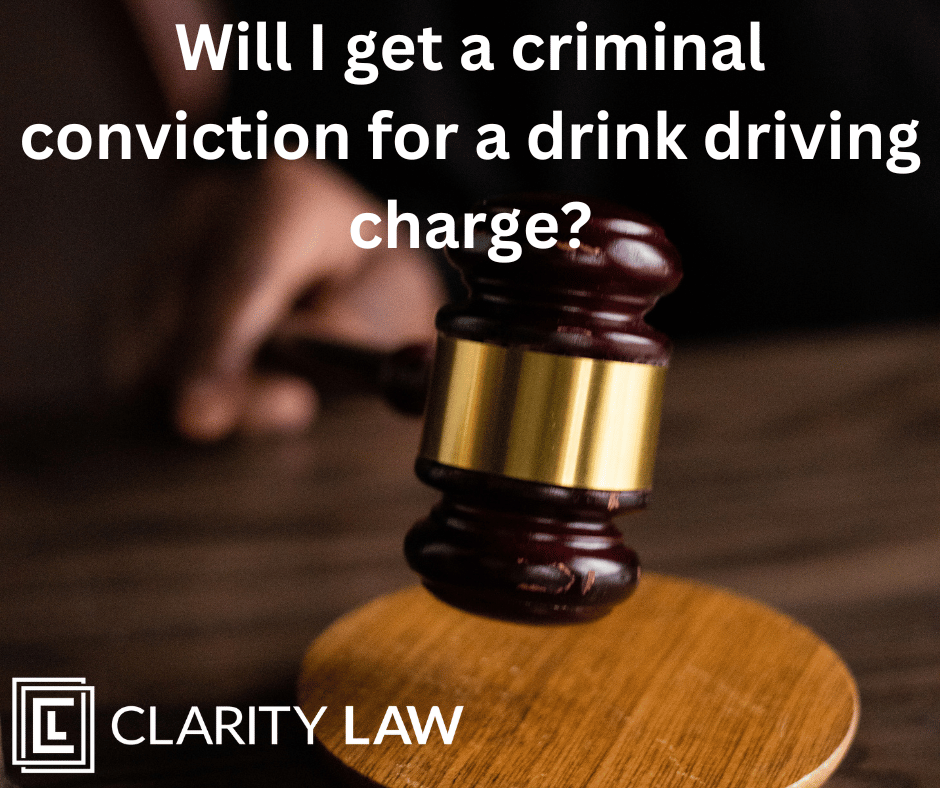
Criminal Convictions for Drink Driving
Will you get a criminal conviction for a drink driving charge in 2024?
Lets take a look at this issue.
Is drink driving a criminal offence in Queensland?
Yes, but it's a simple offence, not a serious "crime." This means it's handled at the Magistrates Court, not the District or Supreme Court.
Will a conviction be recorded on your criminal history?
No. Even though it's a criminal offence, the conviction goes on your traffic history (visible for 5 years) but not your criminal record. So, a standard background check wouldn't show it.
Can you avoid a conviction on your traffic history?
Yes, but only in specific situations. You need to show the court how recording the conviction on your traffic history would significantly impact your life (e.g., job loss). The court decides whether to record a conviction based on the following factors;
The nature of the offence
This is fairly obvious the more serious an offence the more likely a conviction will be recorded. With drink driving the court will look at the BAC reading and whether any accident occurred.
The offender’s character and age
Younger offenders are more likely not to have a conviction recorded for a drink driving charge. This does not mean older offenders will automatically have a conviction recorded as an offenders character is also taken into account. Character would usually be judged on a persons traffic and criminal history (if any).
The impact that recording a conviction will have on the offender
The impact of the recording of a conviction must be taken into account by the court. Given the conviction is going to be recorded on the traffic and not criminal history a person would have to show how a traffic conviction will impact them negatively. This might be a truck driver who if they get a conviction recorded their employer will fire them or they will find it hard to get employment in the future. Employers are increasingly asking for new applicants for a job to show them their traffic history.
Key points:
-
Simple offence
-
Conviction on traffic history, not criminal record
-
Still serious with potential consequences
-
You can ask the court not to record a conviction on your traffic history
Learn more: We have a full article on: Criminal conviction for drink driving
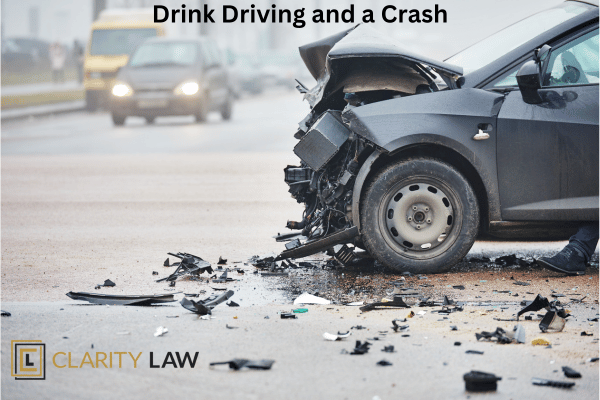
Drink Driving with a Crash
When facing charges for drink driving in Queensland, the occurrence of a crash significantly influences the court's decision on sentencing. Understanding why crashes are relevant and how they affect penalties is crucial for individuals navigating these legal proceedings.
Relevance of Crashes in Traffic Matters
Courts consider crashes as a pivotal factor in assessing the severity of drink driving offences. The occurrence of a crash underscores the real dangers associated with impaired driving, highlighting the potential harm to individuals and property.
Factors Considered in Crash Cases:
Several factors related to the crash itself are evaluated during court proceedings:
-
Impact of the Crash: The extent of damage caused by the crash, including property damage and injuries, is carefully examined.
-
Type of Crash: Whether the crash involved a single vehicle or multiple vehicles can influence the severity of the offence.
-
Injuries Resulting from the Crash: The presence of injuries to individuals involved in the crash is a significant consideration for the court.
-
Monetary Damage: The financial cost of the damage caused by the crash is taken into account when determining penalties.
Impact on Penalties:
Cases involving crashes typically receive more stringent penalties compared to those without crashes. The court may impose higher fines, longer disqualification periods from driving, or additional sanctions. Offenders with a history of drink driving face heightened scrutiny and may receive harsher penalties.
Recommendations for Offenders:
For individuals involved in crashes, completing a traffic offenders' program is often recommended. This demonstrates a proactive approach to addressing the offence and a commitment to driver education and rehabilitation, which may positively influence the court's decision.
Advice for Offenders:
It's essential for offenders involved in crashes to seek guidance from experienced traffic lawyers. A skilled traffic lawyer can provide personalized advice on preparing for sentencing, navigating the legal process, and presenting a compelling case to mitigate penalties.
Comparison of Scenarios:
To illustrate the impact of crashes on sentencing outcomes, consider two hypothetical scenarios:
-
Joe Bloggs: Recorded a blood alcohol concentration (BAC) of 0.103% after a static roadside breath test. Limited traffic history, completed a traffic offenders' program, and received a $650 fine with a 3-month disqualification.
-
John Doe: Involved in a single-vehicle crash with a BAC reading of 0.100%. Had prior speeding fines, no completion of a traffic program, and received an $800 fine with a 6-month disqualification.
Insurance Considerations:
In most cases, insurance coverage is voided when an individual is arrested for drink driving. Offenders should consult their insurance provider to understand the implications for coverage of damages resulting from the crash.
Learn more: We have a full article on: What Happens if You Crash While Drink Driving?
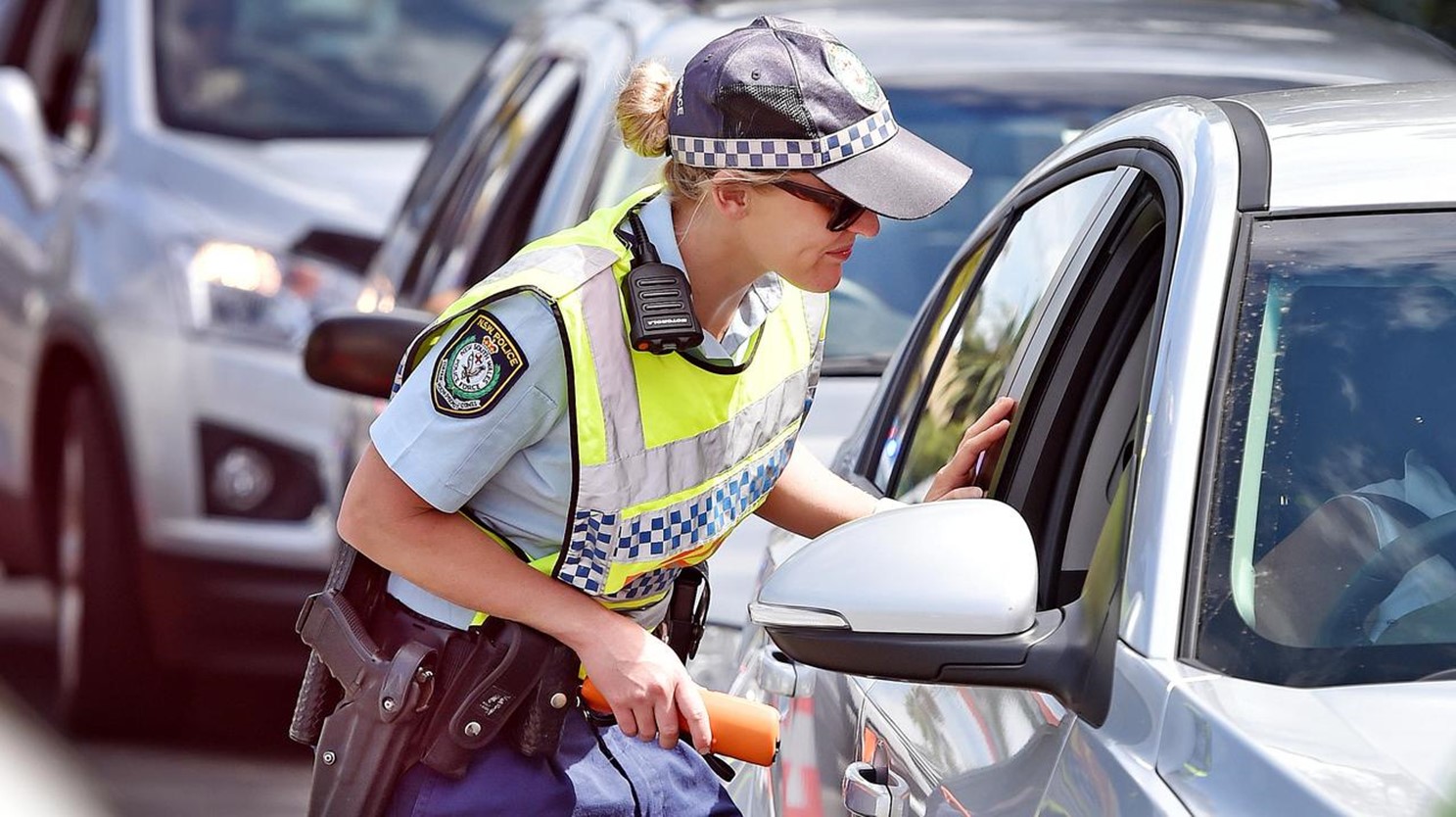
Charged with Other Charges
It might be that in addition to a drink driving offence you are also charged with other offences like careless driving or you have been previously pleaded guilty to other charges that meant your licence was suspended or disqualified at the time you committed the drink driving offence.
The law (section 90B and 90C of the Transport Operations (Road Use Management) Act 1995) states where two disqualifications are running at the same time then special rules applies to decided if the disqualifications are cumulative or concurrent.
Understanding sections 90B and 90C can be quite challenging. Even legal professionals like lawyers, magistrates, and judges find these sections difficult to decipher. This complexity is compounded by Department of Transport and Main Roads occasionally misapplying court-ordered licence disqualifications to traffic records.
Section 90B: Cumulative Disqualifications for Offences Committed at Different Times
This section deals with licence disqualifications for offences committed at various times. If convicted of specific offences like drink-driving, dangerous operation of a vehicle, careless driving, or racing, you face mandatory disqualification. Additionally, the court can disqualify you, even if found not guilty after trial.
If you're convicted again for any of these offences before the initial disqualification ends, the second disqualification doesn't start until the first one ends. This cumulative effect applies to subsequent convictions as long as any previous disqualifications are still active.
Section 90C: Cumulative Disqualifications for Offences Committed at the Same Time
This section involves offences like drink or drug-driving, unlicensed driving, failure to provide breath samples, or dangerous vehicle operation. Here, if you commit any of these offences alongside unlicensed driving, all resulting disqualifications stack on each other.
For example, if you're charged with dangerous driving while already suspended for excessive demerit points, both offences occurring simultaneously lead to cumulative disqualifications.
Conclusion
Navigating these laws is intricate, but seeking legal advice promptly after being charged with a potentially disqualifying offence is crucial. Misunderstanding cumulative disqualifications can lead to unexpected and extended driving bans. As specialists in traffic law, we offer expert guidance to ensure you understand and navigate these complexities effectively.
Learn more with our article on will my disqualification be cumulative ?
Fighting a Drink Driving Charge
Defences to a drink driving charge are rare and difficult to prove however some do exist.
- Potential Defences to a drink driving charge:
-
Not in Charge: This applies if you weren't in the driver's seat, especially while sleeping off the effects.
-
3-Hour Limit: Challenge the timing of the test request if it wasn't made "as soon as practicable" within 3 hours of driving. Police can require breath or blood tests if they suspect you've driven within the past 3 hours. Their reasoning and timing matter. The prosecution needs to show you were over the limit and actually driving (or attempting to) within that 3-hour window.
-
Drinking After Driving: Convince the court the alcohol was consumed after you finished driving. See our full article on Drinking after driving but before a breath test
-
Medical Exemption: Illness or a condition impacting your ability to provide a sample could offer a defence.
-
Police Procedure: Improper procedures by the police might invalidate the evidence.
-
Involuntary Intoxication: If someone tricked you into consuming alcohol unintentionally, it could be a defence.
-
Extraordinary Emergency: Fleeing an assault while intoxicated might be justifiable.
Reality Check:
-
Defences are rare and courts are sceptical. Proving them typically requires strong evidence.
-
Consider negotiation: Talking to the prosecutor might lead to charges being dropped or reduced but again don’t get your hopes up, its extremely rare where a drink driving charge is withdrawn. See our full article on Negotiating with a Prosecutor in Queensland
Learn more: We have a full article on can you beat a drink driving charge?
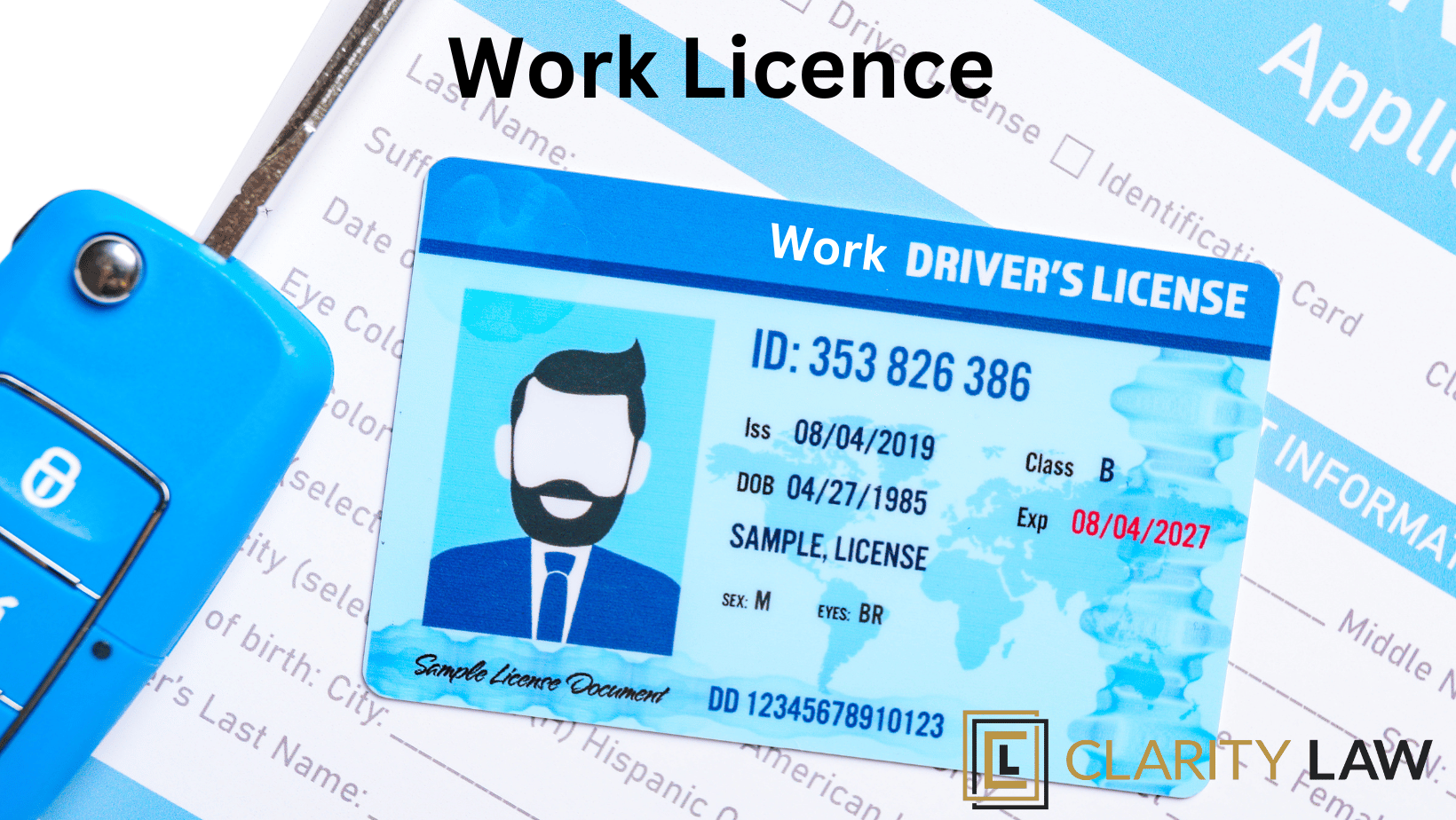
Work Licence
A work licence (also known as a restricted licence, section 87 licence or day licence) is a special type of licence that may be issued by the court to persons convicted of a low or mid-range range drink driving charge (a BAC reading under .15) or certain drug driving charges in Queensland. A work licence replaces your normal Queensland drivers licence for the period of the disqualification imposed by the court.
A work licence can only be used for work purposes; you cannot use a work licence to drive to the shops or dropping kids off at school. A work licence is designed to allow you to continue to earn a living where a driver’s licence is an essential component to you earning that living.
It is also critical to understand that the work licence must be applied for before the court imposes a disqualification period for the drink driving offence. Once the court imposes the licence disqualification you cannot apply for a work licence.
Can I apply for a work licence?
To be eligible to apply for a work licence you must:
-
hold a current Queensland open driver's licence for the vehicle you were driving. The open licence must have been held at the time of committing the offence. Provisional and learner drivers cannot apply for a work licence
-
have had a blood alcohol level of less than 0.15%
-
not have been driving for your job at the time you were charged. There are some exceptions where driving is not the main component of your job e.g. labourers driving to a work site or fencing contractors picking up materials to use onsite
-
not have been driving under a licence that required your blood alcohol level (BAC) to be zero e.g. if you are on a learner, provisional, probationary or restricted licence.
In the last five years you must not have:
-
been convicted anywhere of drink driving or a similar offence
-
been disqualified by any court
-
had a licence suspended or cancelled (except in some limited circumstances like certain SPER suspensions that did not go to court).
-
Applied for a work licence
What do I need to provide in my work licence application?
To apply for a work licence you must file in the court where your drink driving charge is being heard (and serve on the police prosecutor) at least the following;
- An affidavit of yourself setting out;
-
Your personal circumstances like where you live, with who etc
-
What work you do and a detailed explanation of what driving for work you need to do
-
The days and hours you work including any overtime
-
Why you can’t use taxi’s or public transport
-
Your financial circumstances including your income and expenses and those of you partner (if applicable)
-
How your employment or if self-employed your income would be affected by not being granted a work licence
-
How the drink driving charge came about and if necessary you will need to address other offences on your traffic history (or criminal history)
-
What conditions the court should impose on your work licence
-
If you are employed then your employer must provide an affidavit confirming the need for a work licence and if it not granted that you will be deprived of the means of earning your income
-
An application form for a section 87 (Work licence) available at any court registry.
How does the Court judge my application?
In order for the court to grant a work licence you must show the court two things
-
that you are a 'fit and proper person' and
-
if you don't get a work licence this will cause you or your family extreme hardship by depriving you of your means of earning a living.
The court will generally judge whether you are a fit and proper person based on your traffic history. Character references can also help a court decide you are a fit and proper person; this is especially true where your reading was mid-range (between .1 and .149). The other effective thing you can do to improve the courts view of whether you are a fit and proper person is to complete a driving court. There are a number of courses but our strong recommendation is the Queensland Traffic Offenders Program (“QTOP”). The QTOP course is well regarded by the courts and can be done in person or online. Details can be found at their website www.qtop.com.au
The court judges whether you will be derived of the means of earning your income based on yours and if applicable your employer’s affidavit. It is critical to your application to show that you will suffer this extreme hardship. This is usually easier to prove for an employed person as your application must be accompanied by an affidavit of your employer that confirms you will be deprived of the means of earning your income if a work licence is not granted. It is harder to prove for self employed people and may require you to provide financial records to the court or to provide an additional affidavit of your accountant or the person you contract to.
Conditions the Court might impose on a work licence
Generally the court will be looking to impose one or more of the following conditions;
-
Restricting the days and hours you can drive to the bare minimum to complete your job or business requirements
-
Restricting whether you can carry passengers
-
Requiring you to complete a log book before driving
-
Requiring you to wear your work uniform when driving
-
Limiting what classes of vehicle you can drive
Before the Court Date
You need to make sure that before your court date that you;
-
You and your employer (if applicable) need to take the Affidavits to a Justice of the Peace or Solicitor or commissioner of declarations and sign each and every page in their presence;
-
Ensure that the Justice of the Peace or Solicitor witnesses your signature by signing each and every page;
-
Attend the Court Registry and collect an application form for a work licence (these are also available at Queensland Transport) file your original signed Affidavits with 2 photocopies. The Court will stamp them, keep the original and give you two copies back. It is also a good time to file any character references you may wish the court to read.
-
Then attend the Police Prosecutions unit (which is generally in the police station near the court, you should ask the court registry where this is) file one of the copies of the affidavits and the pink copy of the application for a work licence. Also give them a copy of any character reference you filed at the registry.
-
Keep your copies of the affidavits, application form and references and take them to court on the court date.
What should I bring to court for a work licence application?
You should have already filed and served on the police prosecutor all your written material.
You should bring a copy of;
-
Your signed and witnessed affidavit
-
Your Employers signed affidavit (if not self-employed)
-
Any character references you wish to present to the court
-
The application form you filed
You should also bring your driver drivers licence and around $50 to pay for your new licence at Queensland Transport if a work licence is granted.

What will happen in the court?
Please arrive at least 30 minutes before your court time.
Find out which court you are in and wait outside that court. Turn off your phone.
Eventually a Police Prosecutor will arrive you should then go and speak to them and confirm who you are and that you are applying for a work licence. Please make sure they have all your affidavits.
At this point is a good idea to ask the police for a copy of your charge documents and traffic history. Do this by asking for your “QP9” (this is the document number and is what it is referred to in the courts). Check the QP9 while you wait for the court to start to ensure it is correct. If it isn’t go and talk to the Police Prosecutor.
The court will start when the Magistrate enters, please stand whenever the depositions clerk or Police Prosecutor calls ‘all rise’ and then wait for the Magistrate to sit down before sitting yourself.
Wait for your matter to be called and then approach the table where the Police Prosecutor is. You will stand to the far left of the table. Remain standing while the Magistrate asks what you are doing. Tell the Magistrate that you are pleading guilty to the charge and that you wish to apply for a work licence. Please address the Magistrate as “Your Honour”. The Magistrate will then ask you to sit.
The Police Prosecutor will read a brief statement of facts and give the Magistrate a copy of your traffic history and breath analyst certificate. All of these documents will be in the QP9 so you should have already seen them.
Once the Police Prosecutor finishes the Magistrate will read the affidavits and if they have any queries they will ask you. Generally we find the Magistrates will not ask many questions. If you have not already filed any character reference tell the Magistrate you have some, the Police Prosecutor take them from you and will give them to the Magistrate.
If a work licence is granted a Magistrate will first give you a disqualification period and then a fine and finally will read out the terms of the work licence being granted.
You will then be asked to sit outside the court or at the registry to wait for your work licence order. It is this document that you take to Queensland Transport. Please check the order is correct before leaving the registry.
I was granted a work licence – now what?
If you are granted the work licence then before you can drive again then you need to go to Queensland Transport and have your licence re-issued as a work licence. You cannot drive to the Queensland Transport office. Also unless you are returning to work or driving for work purposes from Queensland Transport then you would need a lift home as your work licence would not cover for the trip between Queensland Transport and your home but it would cover you to drive from Queensland Transport back to work.
You must also comply with the requirements of any court order in relation to your licence, this may be the requirement to complete a logbook or similar. Also throughout the period of the work licence you must keep a copy of the court order in any motor vehicle you drive.
If you are caught driving outside the terms of your work licence then you will be disqualified for the balance of the disqualification period left to run plus an additional 3 months.
If you are a mid-range drink driver who is granted a work licence you must install an interlock (see below) to any vehicle you will drive under the work licence.
Learn more: We have a full article on Work Licences in Queensland

Interlock
If you were charged with mid range or high range drink driving (our more than 2 low range drink driving charges within 5 years) then when you go to get your licence back you will have to install an interlock.
The court has no discretion to exempt you from an interlock if this applies to you as it is a Queensland Transport licencing requirement. This is an area that is subject to constant change, for more information visit their website.
There are only very few exemptions and an exemption cannot be regarding work or making an income
Exemption Avenues:
-
Remote Location: Live more than 150km from an installer? Proof of residency (lease, bills, etc.) can grant you an exemption.
-
Island Life: No bridge to the mainland? Similar proof applies. Certain islands like Fraser and Magnetic are excluded, though.
-
Medical Hindrance: A doctor's certificate (F4864) for conditions preventing breath samples could win you an exemption.
-
Severe Family Hardship: This requires convincing the court that not having an interlock would cause extreme difficulties beyond just work or education. Think medical needs, lack of alternative transport, and serious lifestyle disruptions.
Important Notes:
-
Exemptions are rare, so don't get your hopes up too high.
-
Apply before your interlock program starts.
Learn more: We have a full article on exemptions to Installing an Interlock

Drink Driving Statistics in Queensland
Every year the Queensland police service publishes statistics for all crimes in Queensland. Lets have a look at some of those statistics that relate to drink driving.
Total Drink Driving Arrests Per Year:
-
2001: 24,548
-
2002: 26,496
-
2003: 27,222
-
2004: 28,345
-
2005: 30,573
-
2006: 31,776
-
2007: 30,476
-
2008: 32,152
-
2009: 32,465
-
2010: 30,344
-
2011: 27,625
-
2012: 25,959
-
2013: 26,303
-
2014: 24,914
-
2015: 28,774
-
2016: 28,571
-
2017: 29,158
-
2018: 31,156
-
2019: 30,854
-
2020: 24,715
-
2021: 25,408
-
2022: 27,610
-
2023: 26,119
Months with the Most Arrests on Average:
-
June: 2,546 arrests
-
December: 2,537 arrests
-
May: 2,472 arrests
Months with the Least Arrests on Average:
-
April: 2,178 arrests
-
February: 2,134 arrests
-
September: 2,174 arrests
The average yearly drink driving rate in Queensland since 2001 is 29,236 drink driving arrests per year.
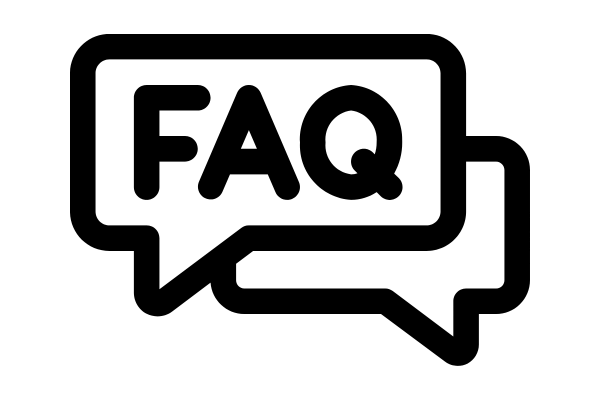
FAQ’s about Drink Driving in Queensland in 2024
Can I drink while driving?
No, you cannot drink liquor while you are the driver or supervisor of a learner driver
Can I ask to change the Court?
If you are pleading guilty to a drink driving offence then most courts will allow you to transfer the matter to the court closet to where you live. This is useful if the drink driving offence occurred along way from where you live especially as all drink driving offences will result in a disqualification so you could not drive home.
Do I have to appear in person?
In almost all circumstances you will need to appear in person at the court to be sentenced. The law states that a person must be present to receive the licence disqualification. Generally the only exceptions the court might consider is where the person lives in another state or country or there is some other compelling reason why they can’t appear in person.
I live in another state and got the drink driving charge while holidaying
If you live in another state and engage a lawyer to act for you the court would likely allow you to appear by phone to finalise the matter. Each court will have different thoughts on this so check with a traffic lawyer whether the court would allow you to appear by phone.
Can I get a work licence for a high range charge?
No, if your reading was high range, that is over .15, you cannot under any circumstances get a work licence. Your goal in that case would be to try and minimise the disqualification period.
Will a disqualification in Queensland apply throughout Australia?
Yes, a disqualification in Queensland applies throughout Australia. See our article on Do Licence Disqualifications apply throughout Australia?
Why You Should Hire a Lawyer for Your Drink Driving Charge in Queensland in 2024
Facing a drink driving charge in Queensland can be a daunting experience, with potential consequences ranging from fines and licence disqualifications to imprisonment. In such circumstances, hiring a qualified and experienced lawyer can make a significant difference in the outcome of your case. Here are several compelling reasons why seeking legal representation is essential when dealing with a drink driving charge in Queensland.
Understanding of the Legal System: Navigating the complexities of Queensland's legal system can be challenging, especially for individuals without legal expertise. A lawyer specialising in drink driving cases possesses in-depth knowledge of relevant laws, procedures, and precedents. They can guide you through each stage of the legal process, ensuring that your rights are protected and advocating on your behalf in court.
Assessment of the Case: A skilled lawyer will thoroughly analyse the details of your drink driving charge and develop a strategic strategy tailored to your specific circumstances.
Minimization of Penalties: If convicted of a drink driving offence in Queensland, you will face penalties such as fines and a licence disqualification. A lawyer can work to minimize the potential consequences of your conviction, advocating for leniency or seeking alternatives to harsh penalties.
Representation in Court: Appearances in court can be intimidating, particularly for individuals unfamiliar with legal proceedings. A lawyer will represent you in court, presenting your case persuasively and effectively to the magistrate.
Support and Guidance: Dealing with a drink driving charge can take a toll on your emotional well-being and personal life. A lawyer can provide invaluable support and guidance throughout the legal process, offering reassurance, answering your questions, and addressing any concerns you may have. They will keep you informed of developments in your case and provide realistic expectations regarding potential outcomes.
Conclusion: When facing a drink driving charge in Queensland, hiring a lawyer is not only advisable but essential. A lawyer's expertise, knowledge of the legal system, negotiation skills, and courtroom experience can significantly impact the outcome of your case. By retaining competent legal representation, you can protect your rights, mitigate the consequences of your charge, and work towards resolving the matter with the best possible outcome. Don't face a drink driving charge alone—seek the assistance of a qualified lawyer to advocate for your interests and safeguard your future.
Why you should never represent yourself in court
Representing yourself in court for a drink driving charge in Queensland is a risk not worth taking. A professional traffic lawyer can provide expert legal advice and representation, potentially saving you time, money, and stress. Don't assume that legal representation is unaffordable—many lawyers offer fixed fees and free initial consultations. If you've been charged with a traffic offence in Queensland, don't hesitate to reach out to a qualified traffic lawyer for assistance. With their expertise, you can navigate the legal process with confidence and work towards the best possible outcome for your case.
I will just use the duty lawyer at court, that’s free
Unless you are facing the prospect of prison then the duty lawyer cannot act for you at court. This means you will be facing the court and the prosecutor on your own.
What to Look for in a Good Drink Driving Lawyer
If you're facing a drink driving charge in Queensland, hiring the right lawyer can make all the difference in the outcome of your case. However, with numerous legal professionals to choose from, knowing what to look for in a good drink driving lawyer can be challenging. Here are some essential qualities and factors to consider when selecting legal representation for your drink driving matter.
Experts in Traffic Law:
First and foremost, look for a lawyer who specialises in traffic law, particularly drink driving cases. Traffic law is a specialised area of practice with its own set of complexities and nuances. A lawyer who focuses exclusively on traffic offences will have in-depth knowledge and experience specific to drink driving matters, increasing the likelihood of a favourable outcome for your case.
Experience and Track Record:
Experience matters when it comes to navigating the legal system effectively. Seek out a lawyer with a proven track record of success in handling drink driving cases. Look for testimonials, case results, and client reviews to gauge their competence and reputation. An experienced lawyer will have a comprehensive understanding of courtroom procedures, negotiation tactics, and strategies relevant to drink driving charges.
Legal Expertise and Knowledge:
Choose a lawyer who possesses a thorough understanding of Queensland's drink driving laws, regulations, and court procedures. They should be up-to-date with recent legal developments and precedents relevant to drink driving offences.
Communication and Accessibility:
Effective communication is essential in any legal case. Look for a lawyer who communicates clearly, promptly, and comprehensively. They should be accessible to address your concerns, answer your questions, and provide updates on your case's progress. A responsive lawyer who keeps you informed every step of the way can alleviate stress and uncertainty throughout the legal process.
Personalized Approach:
Every drink driving case is unique, with its own set of circumstances and complexities. Choose a lawyer who takes a personalised approach to your case, tailoring their strategy to your specific needs and objectives. They should take the time to understand your situation, listen to your concerns, and develop a strategy aligned with your best interests.
Reputation and Professionalism:
Reputation speaks volumes about a lawyer's credibility and reliability. Research the lawyer's reputation within the legal community, including peer reviews, awards, and recognition. Look for professionalism, integrity, and ethical conduct in their interactions with clients and colleagues. A lawyer with a strong reputation for professionalism and ethical practice is more likely to uphold your rights and interests effectively.
Transparent Fees and Costs:
Legal fees can vary significantly among lawyers, so it's essential to clarify the fee structure upfront. Look for a lawyer who offers transparent pricing and outlines all potential costs associated with your case on their website. The lawyer should also only put any money you provide into a trust account monitored by the Queensland Law Society.
Comfort and Trust:
Lastly, trust your instincts when selecting a drink driving lawyer. Choose someone with whom you feel comfortable discussing your case openly and honestly. Building trust and rapport with your lawyer is essential for effective communication and collaboration throughout the legal process. Select a lawyer who instils confidence and reassurance, demonstrating a genuine commitment to achieving the best possible outcome for your case.
In conclusion, selecting the right drink driving lawyer requires careful consideration of their specialization, experience, expertise, communication style, reputation, transparency, and personal rapport. By prioritizing these qualities and factors, you can make an informed decision and secure competent legal representation to navigate your drink driving matter with confidence and peace of mind.
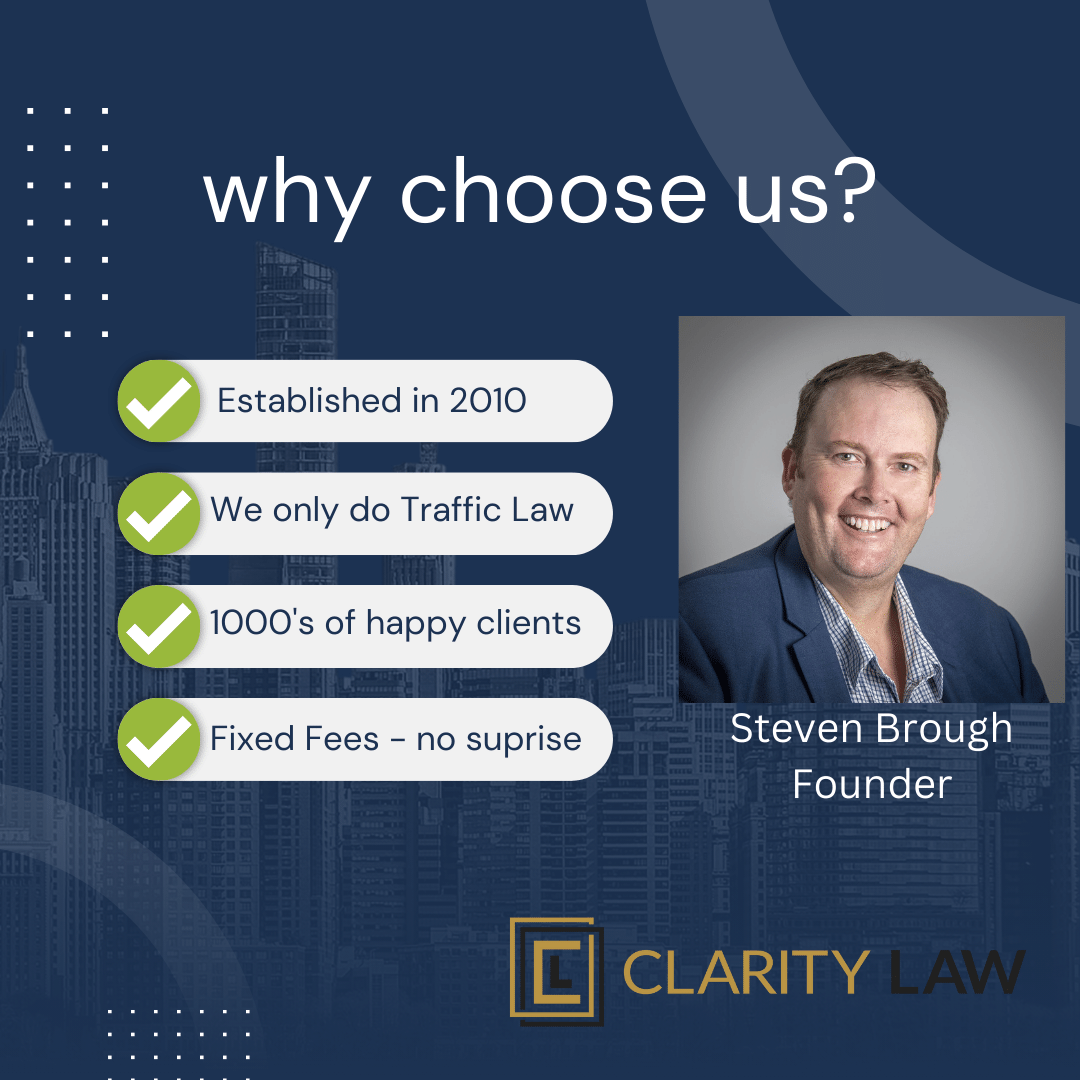
Why Hire Clarity Law to Represent you for a Drink Driving Charge?
Since 2010 we have been representing people throughout Southeast Queensland who have been charged with traffic offences such as drink driving and need a good drink driving lawyer to represent them. We aren’t a firm that does traffic law as just one area of law, we do traffic law exclusively. This means we have handled over 1,500 drink driving matters.
Our client’s often come to us nervous, worried and needing answers. This is not a time for uncertainty over your future nor the costs you will pay. The stress that a drink driving charge causes to people can be overwhelming, having an experienced drink driving law firm to help will give you a lot of relief.
We strive to give you immediate comprehensive advice and a fixed fee so you can be sure of your legal costs and whether you qualify for a work licence. While we will never be the cheapest we do offer the best value in our humble opinion.
Steven Brough our founder is one of the most experienced traffic lawyers in Queensland and makes sure the whole firm is professional, caring and effective in getting the best for our clients.
Is this all going to be a hassle to engage you?
No, we have offices in Brisbane and on the Gold Coast, Sunshine Coast, in Strathpine, Loganholme, Ipswich and Hervey Bay but in most cases we can handle everything by email and the phone without you ever having to come into our office. We are also open outside normal business hours for your convenience.
Most of the information we require you can complete with an online form from your phone or tablet.
You will also have the direct email address and mobile phone number of your lawyer so you can ask any question you may have. We believe in given client the very best experience possible and that starts with great communication and fast responses to your queries. Our client services manager Belinda is also just a phone call or email away to answer any questions you have.

Our Team
Every one of our traffic lawyers is extremely experienced appearing in the courts every week representing people charged with drink driving.

Steven Brough – Founder and traffic lawyer (22+ years experience)

Russell Tannock – Traffic lawyer (8+ years experience)

Jack Marshall – Traffic lawyer (2+years experience)

Jacob Purden – Traffic lawyer (8+ years experience)

Belinda Smyth – Client Services Manager (21+ years experience)
Between our lawyers we have appeared in court over 1500 times representing clients with driving charges throughout Southeast Queensland.
What do you charge?
We charge a flat upfront fee for our services, that means no hidden charges or unexpected bills. The money goes into a trust account and cannot be taken by us until the matter is completed.
We are also upfront with our fees, if you look at other law firms few, if any, clearly list how much they are going to charge you. Clarity Law on the other hand are happy to list our prices as we are sure that although we are not the cheapest our prices, given our experience, is very competitive
Work Licence (includes price of guilty plea) $2,200
Drink Driving - Low range $1,499
Drink Driving - Mid range $1,599
Drink Driving - High range $1,699
Where are your offices located?
We have 7 offices across Southeast Queensland. Please always ring first as your local office may be unattended if our staff are in court. We have spent years developing systems that mean in most cases you won’t even need to come in to see us to engage the best legal representation.
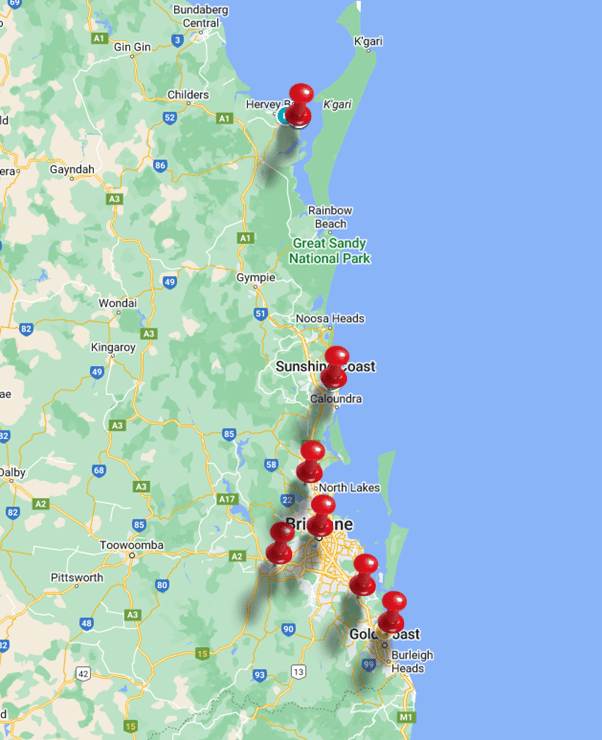
If I contacted you what would occur?
If you contact us, then Steven Brough the firm’s founder or our office manager Belinda Smyth will take the call or receive the email or contact form. They have over 45 years legal experience between them, we can provide immediate legal assistance and answer any questions you have. We will discuss your case, provide guidance and send a quote by email with additional relevant information about your charge, all at no cost.
If you want to engage us then it’s easy, there is a form you can complete online in less than 15 minutes. If you don’t want to engage us or want to engage another firm that’s fine, you won’t be hassled and at worst you will just have more information about your charge. Once engaged one of our lawyers will go through your matter and contact you to discuss what the best way forward is to achieve the best results. Every one of our lawyers are very experienced with many hundreds of courts appearances for drink driving charges each.
Remember its critical you get advice before going to court, a drink driving charge no matter the reading will have an impact on you, your family and your employment or business.
How do I get more information or engage you to act for me?
If you want to engage us or just need further information or advice then you can either;
-
Use our contact form and we will contact you by email or phone at a time that suits you
-
Call us on 1300 952 255 seven days a week, 7am to 7pm
-
Click here to select a time for us to have a free 15 minute telephone conference with you
-
Email This email address is being protected from spambots. You need JavaScript enabled to view it.
-
Send us a message on Facebook Messenger
-
Click the help button to the right and leave us a message





